MARINE INSURANCE LAW 10 10 MARINE INSURANCE LAW Marine Insurance Law Name of the Student Name of the University Author
VerifiedAdded on 2022/10/12
|16
|4947
|186
AI Summary
MARINE INSURANCE LAW MARINE INSURANCE LAW 10 10 MARINE INSURANCE LAW 1906 Marine Insurance Law Name of the Student Name of the University Author Note Question 1(a) The issue arising from the given situation is the rights and obligations that the insurer owns under the contract of insurance with Bora. The insurer, who has been providing assurance to the assured against the policy that has been purchased by the assured relation to any insurable interest, would be conferred with certain rights as well as imposed with certain
Contribute Materials
Your contribution can guide someone’s learning journey. Share your
documents today.
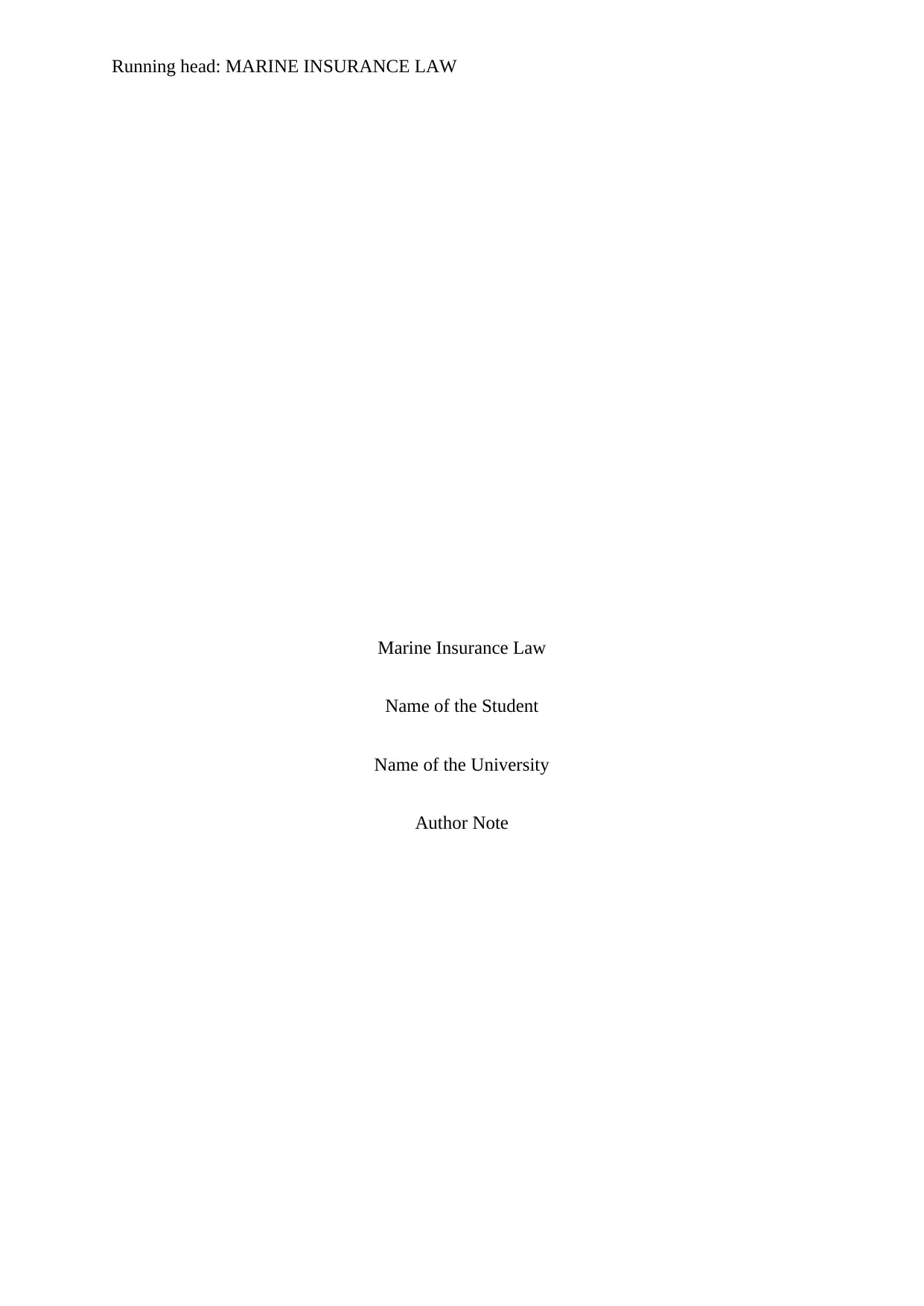
Running head: MARINE INSURANCE LAW
Marine Insurance Law
Name of the Student
Name of the University
Author Note
Marine Insurance Law
Name of the Student
Name of the University
Author Note
Secure Best Marks with AI Grader
Need help grading? Try our AI Grader for instant feedback on your assignments.
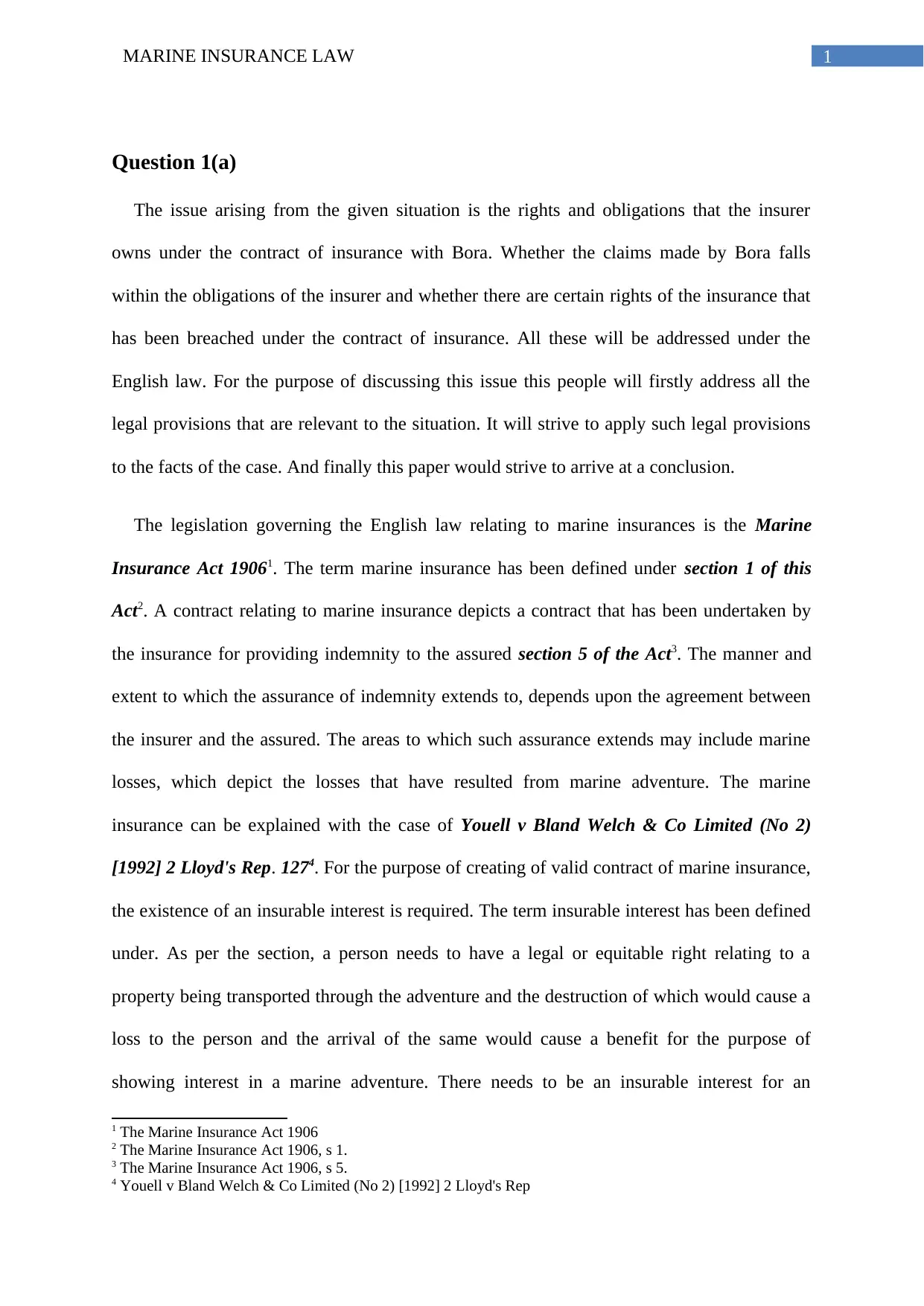
1MARINE INSURANCE LAW
Question 1(a)
The issue arising from the given situation is the rights and obligations that the insurer
owns under the contract of insurance with Bora. Whether the claims made by Bora falls
within the obligations of the insurer and whether there are certain rights of the insurance that
has been breached under the contract of insurance. All these will be addressed under the
English law. For the purpose of discussing this issue this people will firstly address all the
legal provisions that are relevant to the situation. It will strive to apply such legal provisions
to the facts of the case. And finally this paper would strive to arrive at a conclusion.
The legislation governing the English law relating to marine insurances is the Marine
Insurance Act 19061. The term marine insurance has been defined under section 1 of this
Act2. A contract relating to marine insurance depicts a contract that has been undertaken by
the insurance for providing indemnity to the assured section 5 of the Act3. The manner and
extent to which the assurance of indemnity extends to, depends upon the agreement between
the insurer and the assured. The areas to which such assurance extends may include marine
losses, which depict the losses that have resulted from marine adventure. The marine
insurance can be explained with the case of Youell v Bland Welch & Co Limited (No 2)
[1992] 2 Lloyd's Rep. 1274. For the purpose of creating of valid contract of marine insurance,
the existence of an insurable interest is required. The term insurable interest has been defined
under. As per the section, a person needs to have a legal or equitable right relating to a
property being transported through the adventure and the destruction of which would cause a
loss to the person and the arrival of the same would cause a benefit for the purpose of
showing interest in a marine adventure. There needs to be an insurable interest for an
1 The Marine Insurance Act 1906
2 The Marine Insurance Act 1906, s 1.
3 The Marine Insurance Act 1906, s 5.
4 Youell v Bland Welch & Co Limited (No 2) [1992] 2 Lloyd's Rep
Question 1(a)
The issue arising from the given situation is the rights and obligations that the insurer
owns under the contract of insurance with Bora. Whether the claims made by Bora falls
within the obligations of the insurer and whether there are certain rights of the insurance that
has been breached under the contract of insurance. All these will be addressed under the
English law. For the purpose of discussing this issue this people will firstly address all the
legal provisions that are relevant to the situation. It will strive to apply such legal provisions
to the facts of the case. And finally this paper would strive to arrive at a conclusion.
The legislation governing the English law relating to marine insurances is the Marine
Insurance Act 19061. The term marine insurance has been defined under section 1 of this
Act2. A contract relating to marine insurance depicts a contract that has been undertaken by
the insurance for providing indemnity to the assured section 5 of the Act3. The manner and
extent to which the assurance of indemnity extends to, depends upon the agreement between
the insurer and the assured. The areas to which such assurance extends may include marine
losses, which depict the losses that have resulted from marine adventure. The marine
insurance can be explained with the case of Youell v Bland Welch & Co Limited (No 2)
[1992] 2 Lloyd's Rep. 1274. For the purpose of creating of valid contract of marine insurance,
the existence of an insurable interest is required. The term insurable interest has been defined
under. As per the section, a person needs to have a legal or equitable right relating to a
property being transported through the adventure and the destruction of which would cause a
loss to the person and the arrival of the same would cause a benefit for the purpose of
showing interest in a marine adventure. There needs to be an insurable interest for an
1 The Marine Insurance Act 1906
2 The Marine Insurance Act 1906, s 1.
3 The Marine Insurance Act 1906, s 5.
4 Youell v Bland Welch & Co Limited (No 2) [1992] 2 Lloyd's Rep
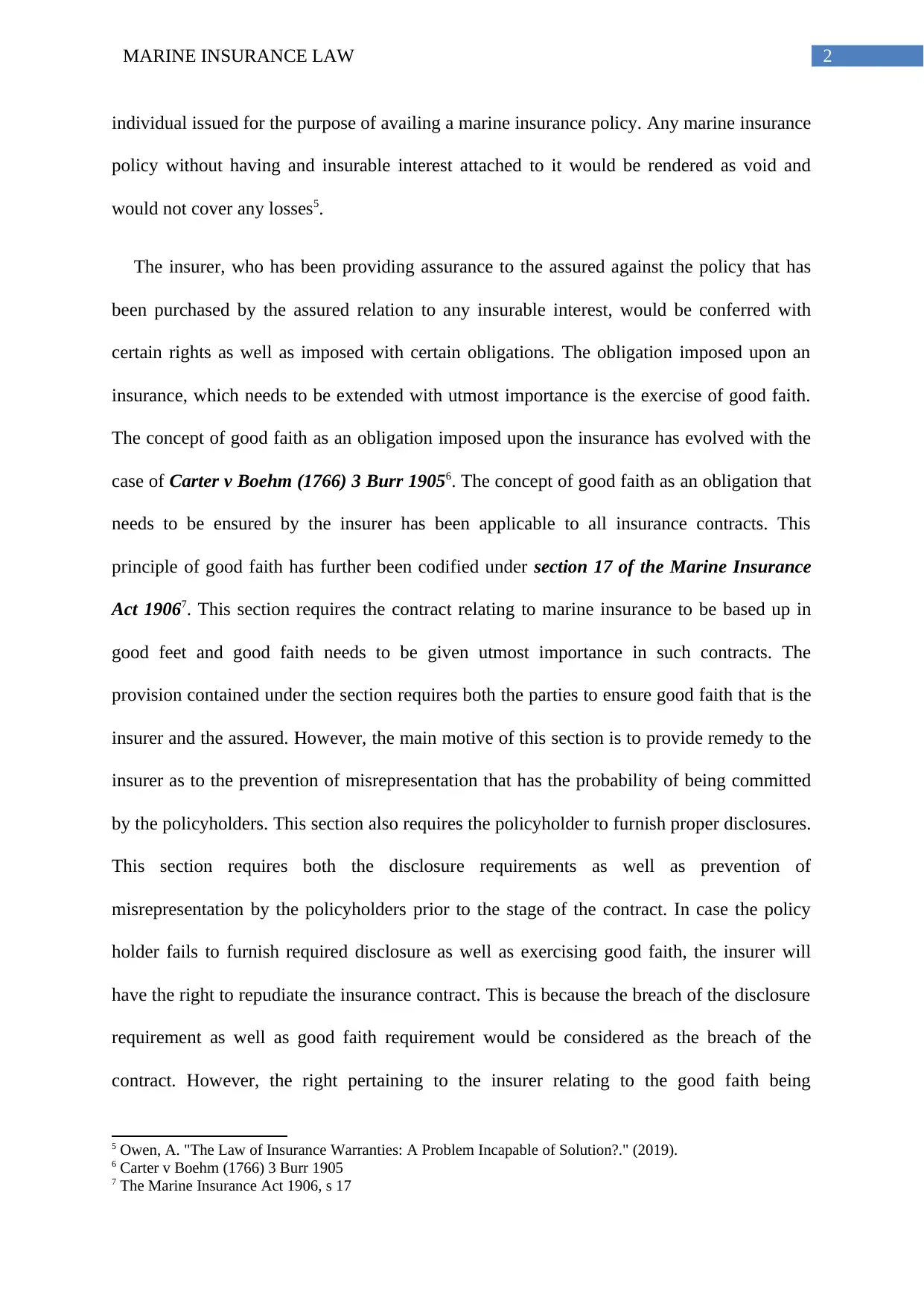
2MARINE INSURANCE LAW
individual issued for the purpose of availing a marine insurance policy. Any marine insurance
policy without having and insurable interest attached to it would be rendered as void and
would not cover any losses5.
The insurer, who has been providing assurance to the assured against the policy that has
been purchased by the assured relation to any insurable interest, would be conferred with
certain rights as well as imposed with certain obligations. The obligation imposed upon an
insurance, which needs to be extended with utmost importance is the exercise of good faith.
The concept of good faith as an obligation imposed upon the insurance has evolved with the
case of Carter v Boehm (1766) 3 Burr 19056. The concept of good faith as an obligation that
needs to be ensured by the insurer has been applicable to all insurance contracts. This
principle of good faith has further been codified under section 17 of the Marine Insurance
Act 19067. This section requires the contract relating to marine insurance to be based up in
good feet and good faith needs to be given utmost importance in such contracts. The
provision contained under the section requires both the parties to ensure good faith that is the
insurer and the assured. However, the main motive of this section is to provide remedy to the
insurer as to the prevention of misrepresentation that has the probability of being committed
by the policyholders. This section also requires the policyholder to furnish proper disclosures.
This section requires both the disclosure requirements as well as prevention of
misrepresentation by the policyholders prior to the stage of the contract. In case the policy
holder fails to furnish required disclosure as well as exercising good faith, the insurer will
have the right to repudiate the insurance contract. This is because the breach of the disclosure
requirement as well as good faith requirement would be considered as the breach of the
contract. However, the right pertaining to the insurer relating to the good faith being
5 Owen, A. "The Law of Insurance Warranties: A Problem Incapable of Solution?." (2019).
6 Carter v Boehm (1766) 3 Burr 1905
7 The Marine Insurance Act 1906, s 17
individual issued for the purpose of availing a marine insurance policy. Any marine insurance
policy without having and insurable interest attached to it would be rendered as void and
would not cover any losses5.
The insurer, who has been providing assurance to the assured against the policy that has
been purchased by the assured relation to any insurable interest, would be conferred with
certain rights as well as imposed with certain obligations. The obligation imposed upon an
insurance, which needs to be extended with utmost importance is the exercise of good faith.
The concept of good faith as an obligation imposed upon the insurance has evolved with the
case of Carter v Boehm (1766) 3 Burr 19056. The concept of good faith as an obligation that
needs to be ensured by the insurer has been applicable to all insurance contracts. This
principle of good faith has further been codified under section 17 of the Marine Insurance
Act 19067. This section requires the contract relating to marine insurance to be based up in
good feet and good faith needs to be given utmost importance in such contracts. The
provision contained under the section requires both the parties to ensure good faith that is the
insurer and the assured. However, the main motive of this section is to provide remedy to the
insurer as to the prevention of misrepresentation that has the probability of being committed
by the policyholders. This section also requires the policyholder to furnish proper disclosures.
This section requires both the disclosure requirements as well as prevention of
misrepresentation by the policyholders prior to the stage of the contract. In case the policy
holder fails to furnish required disclosure as well as exercising good faith, the insurer will
have the right to repudiate the insurance contract. This is because the breach of the disclosure
requirement as well as good faith requirement would be considered as the breach of the
contract. However, the right pertaining to the insurer relating to the good faith being
5 Owen, A. "The Law of Insurance Warranties: A Problem Incapable of Solution?." (2019).
6 Carter v Boehm (1766) 3 Burr 1905
7 The Marine Insurance Act 1906, s 17
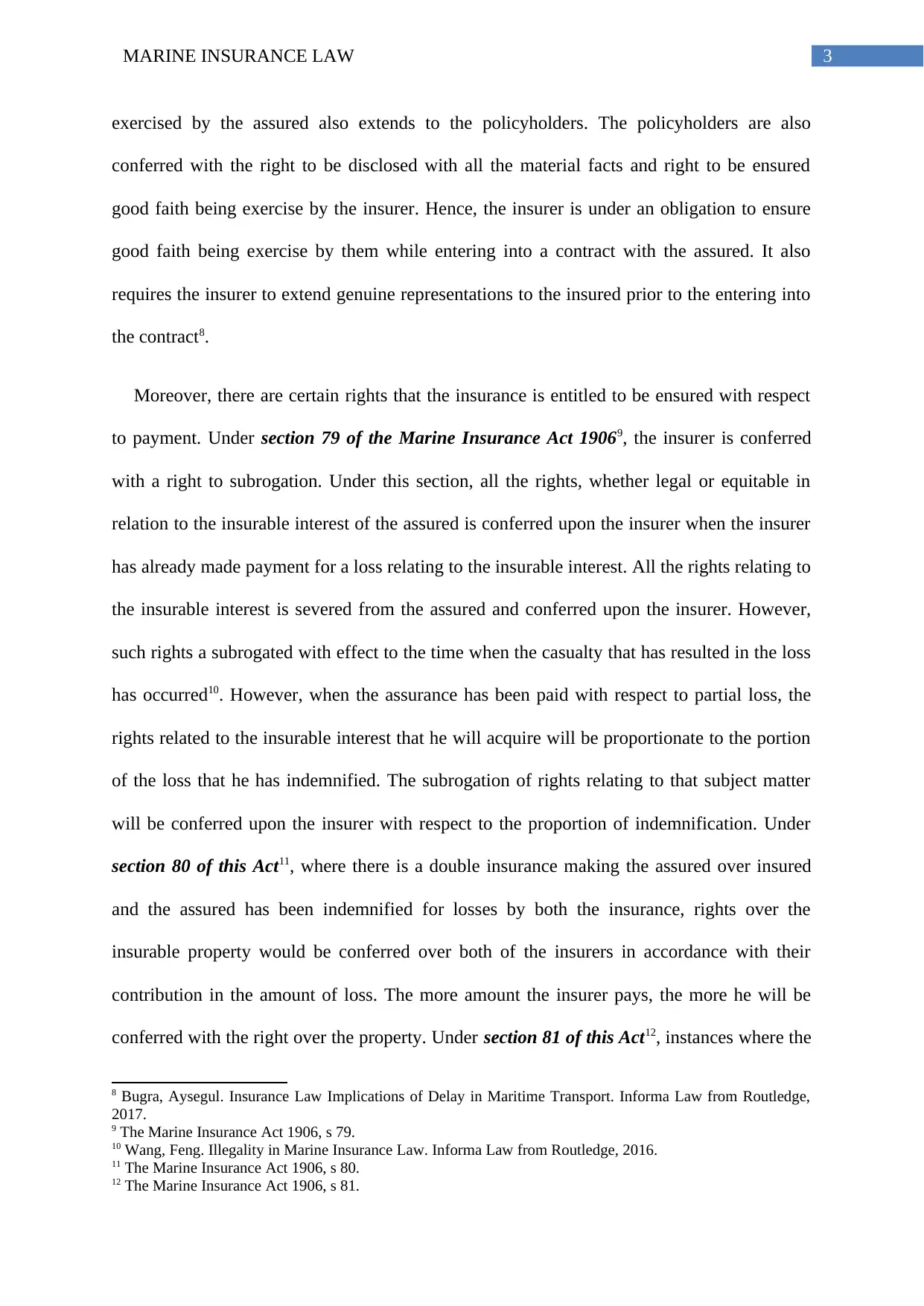
3MARINE INSURANCE LAW
exercised by the assured also extends to the policyholders. The policyholders are also
conferred with the right to be disclosed with all the material facts and right to be ensured
good faith being exercise by the insurer. Hence, the insurer is under an obligation to ensure
good faith being exercise by them while entering into a contract with the assured. It also
requires the insurer to extend genuine representations to the insured prior to the entering into
the contract8.
Moreover, there are certain rights that the insurance is entitled to be ensured with respect
to payment. Under section 79 of the Marine Insurance Act 19069, the insurer is conferred
with a right to subrogation. Under this section, all the rights, whether legal or equitable in
relation to the insurable interest of the assured is conferred upon the insurer when the insurer
has already made payment for a loss relating to the insurable interest. All the rights relating to
the insurable interest is severed from the assured and conferred upon the insurer. However,
such rights a subrogated with effect to the time when the casualty that has resulted in the loss
has occurred10. However, when the assurance has been paid with respect to partial loss, the
rights related to the insurable interest that he will acquire will be proportionate to the portion
of the loss that he has indemnified. The subrogation of rights relating to that subject matter
will be conferred upon the insurer with respect to the proportion of indemnification. Under
section 80 of this Act11, where there is a double insurance making the assured over insured
and the assured has been indemnified for losses by both the insurance, rights over the
insurable property would be conferred over both of the insurers in accordance with their
contribution in the amount of loss. The more amount the insurer pays, the more he will be
conferred with the right over the property. Under section 81 of this Act12, instances where the
8 Bugra, Aysegul. Insurance Law Implications of Delay in Maritime Transport. Informa Law from Routledge,
2017.
9 The Marine Insurance Act 1906, s 79.
10 Wang, Feng. Illegality in Marine Insurance Law. Informa Law from Routledge, 2016.
11 The Marine Insurance Act 1906, s 80.
12 The Marine Insurance Act 1906, s 81.
exercised by the assured also extends to the policyholders. The policyholders are also
conferred with the right to be disclosed with all the material facts and right to be ensured
good faith being exercise by the insurer. Hence, the insurer is under an obligation to ensure
good faith being exercise by them while entering into a contract with the assured. It also
requires the insurer to extend genuine representations to the insured prior to the entering into
the contract8.
Moreover, there are certain rights that the insurance is entitled to be ensured with respect
to payment. Under section 79 of the Marine Insurance Act 19069, the insurer is conferred
with a right to subrogation. Under this section, all the rights, whether legal or equitable in
relation to the insurable interest of the assured is conferred upon the insurer when the insurer
has already made payment for a loss relating to the insurable interest. All the rights relating to
the insurable interest is severed from the assured and conferred upon the insurer. However,
such rights a subrogated with effect to the time when the casualty that has resulted in the loss
has occurred10. However, when the assurance has been paid with respect to partial loss, the
rights related to the insurable interest that he will acquire will be proportionate to the portion
of the loss that he has indemnified. The subrogation of rights relating to that subject matter
will be conferred upon the insurer with respect to the proportion of indemnification. Under
section 80 of this Act11, where there is a double insurance making the assured over insured
and the assured has been indemnified for losses by both the insurance, rights over the
insurable property would be conferred over both of the insurers in accordance with their
contribution in the amount of loss. The more amount the insurer pays, the more he will be
conferred with the right over the property. Under section 81 of this Act12, instances where the
8 Bugra, Aysegul. Insurance Law Implications of Delay in Maritime Transport. Informa Law from Routledge,
2017.
9 The Marine Insurance Act 1906, s 79.
10 Wang, Feng. Illegality in Marine Insurance Law. Informa Law from Routledge, 2016.
11 The Marine Insurance Act 1906, s 80.
12 The Marine Insurance Act 1906, s 81.
Secure Best Marks with AI Grader
Need help grading? Try our AI Grader for instant feedback on your assignments.
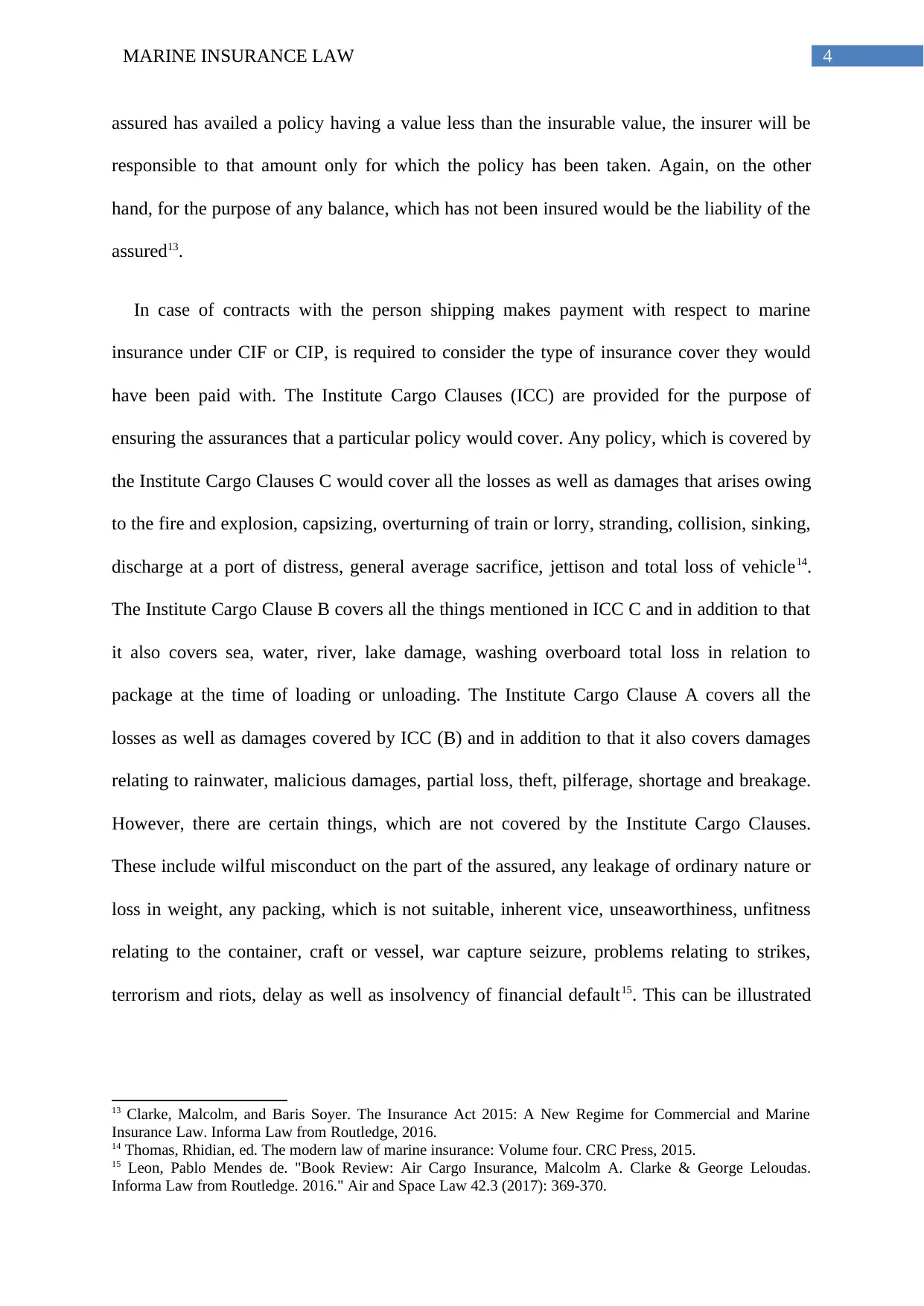
4MARINE INSURANCE LAW
assured has availed a policy having a value less than the insurable value, the insurer will be
responsible to that amount only for which the policy has been taken. Again, on the other
hand, for the purpose of any balance, which has not been insured would be the liability of the
assured13.
In case of contracts with the person shipping makes payment with respect to marine
insurance under CIF or CIP, is required to consider the type of insurance cover they would
have been paid with. The Institute Cargo Clauses (ICC) are provided for the purpose of
ensuring the assurances that a particular policy would cover. Any policy, which is covered by
the Institute Cargo Clauses C would cover all the losses as well as damages that arises owing
to the fire and explosion, capsizing, overturning of train or lorry, stranding, collision, sinking,
discharge at a port of distress, general average sacrifice, jettison and total loss of vehicle14.
The Institute Cargo Clause B covers all the things mentioned in ICC C and in addition to that
it also covers sea, water, river, lake damage, washing overboard total loss in relation to
package at the time of loading or unloading. The Institute Cargo Clause A covers all the
losses as well as damages covered by ICC (B) and in addition to that it also covers damages
relating to rainwater, malicious damages, partial loss, theft, pilferage, shortage and breakage.
However, there are certain things, which are not covered by the Institute Cargo Clauses.
These include wilful misconduct on the part of the assured, any leakage of ordinary nature or
loss in weight, any packing, which is not suitable, inherent vice, unseaworthiness, unfitness
relating to the container, craft or vessel, war capture seizure, problems relating to strikes,
terrorism and riots, delay as well as insolvency of financial default15. This can be illustrated
13 Clarke, Malcolm, and Baris Soyer. The Insurance Act 2015: A New Regime for Commercial and Marine
Insurance Law. Informa Law from Routledge, 2016.
14 Thomas, Rhidian, ed. The modern law of marine insurance: Volume four. CRC Press, 2015.
15 Leon, Pablo Mendes de. "Book Review: Air Cargo Insurance, Malcolm A. Clarke & George Leloudas.
Informa Law from Routledge. 2016." Air and Space Law 42.3 (2017): 369-370.
assured has availed a policy having a value less than the insurable value, the insurer will be
responsible to that amount only for which the policy has been taken. Again, on the other
hand, for the purpose of any balance, which has not been insured would be the liability of the
assured13.
In case of contracts with the person shipping makes payment with respect to marine
insurance under CIF or CIP, is required to consider the type of insurance cover they would
have been paid with. The Institute Cargo Clauses (ICC) are provided for the purpose of
ensuring the assurances that a particular policy would cover. Any policy, which is covered by
the Institute Cargo Clauses C would cover all the losses as well as damages that arises owing
to the fire and explosion, capsizing, overturning of train or lorry, stranding, collision, sinking,
discharge at a port of distress, general average sacrifice, jettison and total loss of vehicle14.
The Institute Cargo Clause B covers all the things mentioned in ICC C and in addition to that
it also covers sea, water, river, lake damage, washing overboard total loss in relation to
package at the time of loading or unloading. The Institute Cargo Clause A covers all the
losses as well as damages covered by ICC (B) and in addition to that it also covers damages
relating to rainwater, malicious damages, partial loss, theft, pilferage, shortage and breakage.
However, there are certain things, which are not covered by the Institute Cargo Clauses.
These include wilful misconduct on the part of the assured, any leakage of ordinary nature or
loss in weight, any packing, which is not suitable, inherent vice, unseaworthiness, unfitness
relating to the container, craft or vessel, war capture seizure, problems relating to strikes,
terrorism and riots, delay as well as insolvency of financial default15. This can be illustrated
13 Clarke, Malcolm, and Baris Soyer. The Insurance Act 2015: A New Regime for Commercial and Marine
Insurance Law. Informa Law from Routledge, 2016.
14 Thomas, Rhidian, ed. The modern law of marine insurance: Volume four. CRC Press, 2015.
15 Leon, Pablo Mendes de. "Book Review: Air Cargo Insurance, Malcolm A. Clarke & George Leloudas.
Informa Law from Routledge. 2016." Air and Space Law 42.3 (2017): 369-370.
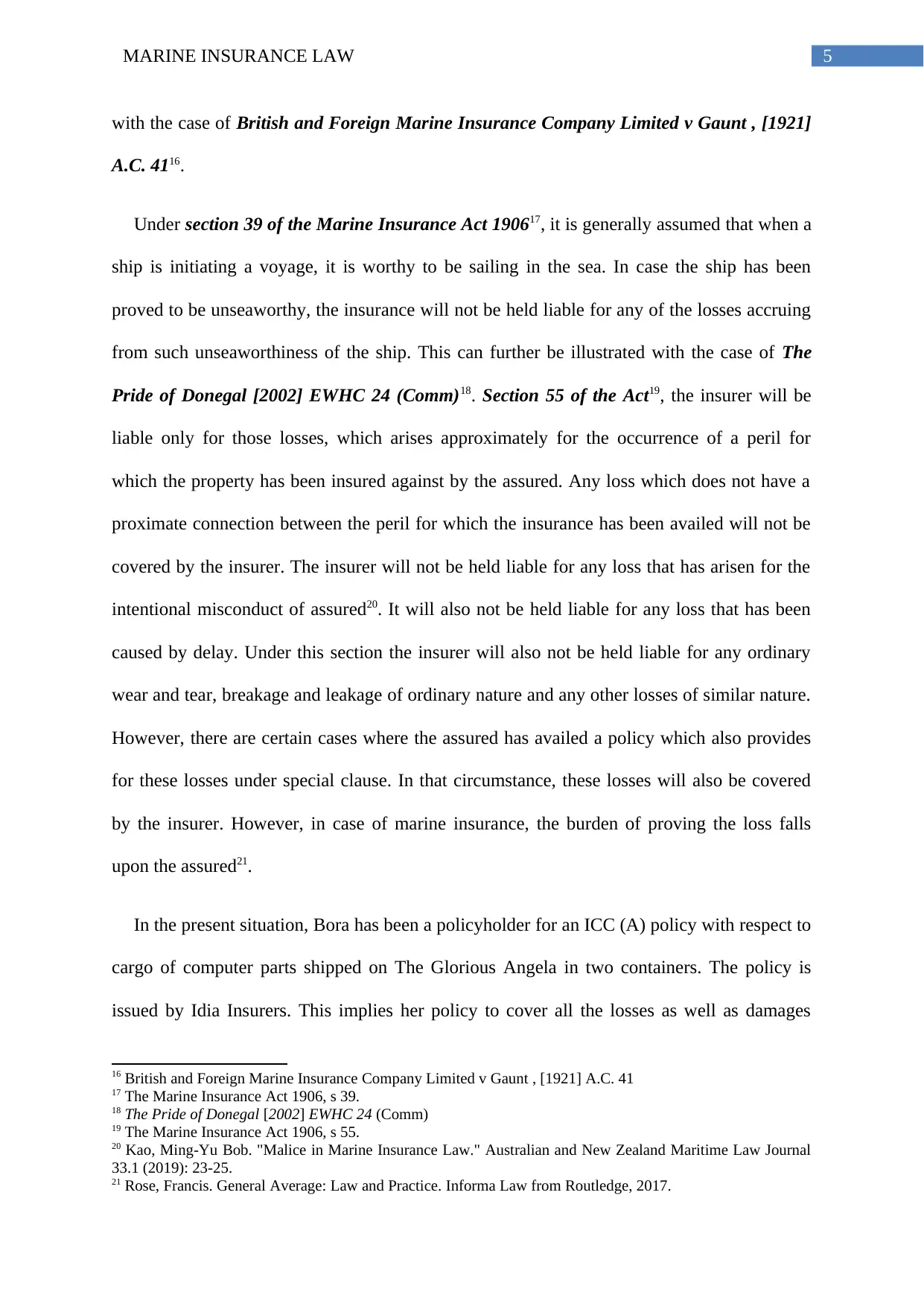
5MARINE INSURANCE LAW
with the case of British and Foreign Marine Insurance Company Limited v Gaunt , [1921]
A.C. 4116.
Under section 39 of the Marine Insurance Act 190617, it is generally assumed that when a
ship is initiating a voyage, it is worthy to be sailing in the sea. In case the ship has been
proved to be unseaworthy, the insurance will not be held liable for any of the losses accruing
from such unseaworthiness of the ship. This can further be illustrated with the case of The
Pride of Donegal [2002] EWHC 24 (Comm)18. Section 55 of the Act19, the insurer will be
liable only for those losses, which arises approximately for the occurrence of a peril for
which the property has been insured against by the assured. Any loss which does not have a
proximate connection between the peril for which the insurance has been availed will not be
covered by the insurer. The insurer will not be held liable for any loss that has arisen for the
intentional misconduct of assured20. It will also not be held liable for any loss that has been
caused by delay. Under this section the insurer will also not be held liable for any ordinary
wear and tear, breakage and leakage of ordinary nature and any other losses of similar nature.
However, there are certain cases where the assured has availed a policy which also provides
for these losses under special clause. In that circumstance, these losses will also be covered
by the insurer. However, in case of marine insurance, the burden of proving the loss falls
upon the assured21.
In the present situation, Bora has been a policyholder for an ICC (A) policy with respect to
cargo of computer parts shipped on The Glorious Angela in two containers. The policy is
issued by Idia Insurers. This implies her policy to cover all the losses as well as damages
16 British and Foreign Marine Insurance Company Limited v Gaunt , [1921] A.C. 41
17 The Marine Insurance Act 1906, s 39.
18 The Pride of Donegal [2002] EWHC 24 (Comm)
19 The Marine Insurance Act 1906, s 55.
20 Kao, Ming-Yu Bob. "Malice in Marine Insurance Law." Australian and New Zealand Maritime Law Journal
33.1 (2019): 23-25.
21 Rose, Francis. General Average: Law and Practice. Informa Law from Routledge, 2017.
with the case of British and Foreign Marine Insurance Company Limited v Gaunt , [1921]
A.C. 4116.
Under section 39 of the Marine Insurance Act 190617, it is generally assumed that when a
ship is initiating a voyage, it is worthy to be sailing in the sea. In case the ship has been
proved to be unseaworthy, the insurance will not be held liable for any of the losses accruing
from such unseaworthiness of the ship. This can further be illustrated with the case of The
Pride of Donegal [2002] EWHC 24 (Comm)18. Section 55 of the Act19, the insurer will be
liable only for those losses, which arises approximately for the occurrence of a peril for
which the property has been insured against by the assured. Any loss which does not have a
proximate connection between the peril for which the insurance has been availed will not be
covered by the insurer. The insurer will not be held liable for any loss that has arisen for the
intentional misconduct of assured20. It will also not be held liable for any loss that has been
caused by delay. Under this section the insurer will also not be held liable for any ordinary
wear and tear, breakage and leakage of ordinary nature and any other losses of similar nature.
However, there are certain cases where the assured has availed a policy which also provides
for these losses under special clause. In that circumstance, these losses will also be covered
by the insurer. However, in case of marine insurance, the burden of proving the loss falls
upon the assured21.
In the present situation, Bora has been a policyholder for an ICC (A) policy with respect to
cargo of computer parts shipped on The Glorious Angela in two containers. The policy is
issued by Idia Insurers. This implies her policy to cover all the losses as well as damages
16 British and Foreign Marine Insurance Company Limited v Gaunt , [1921] A.C. 41
17 The Marine Insurance Act 1906, s 39.
18 The Pride of Donegal [2002] EWHC 24 (Comm)
19 The Marine Insurance Act 1906, s 55.
20 Kao, Ming-Yu Bob. "Malice in Marine Insurance Law." Australian and New Zealand Maritime Law Journal
33.1 (2019): 23-25.
21 Rose, Francis. General Average: Law and Practice. Informa Law from Routledge, 2017.
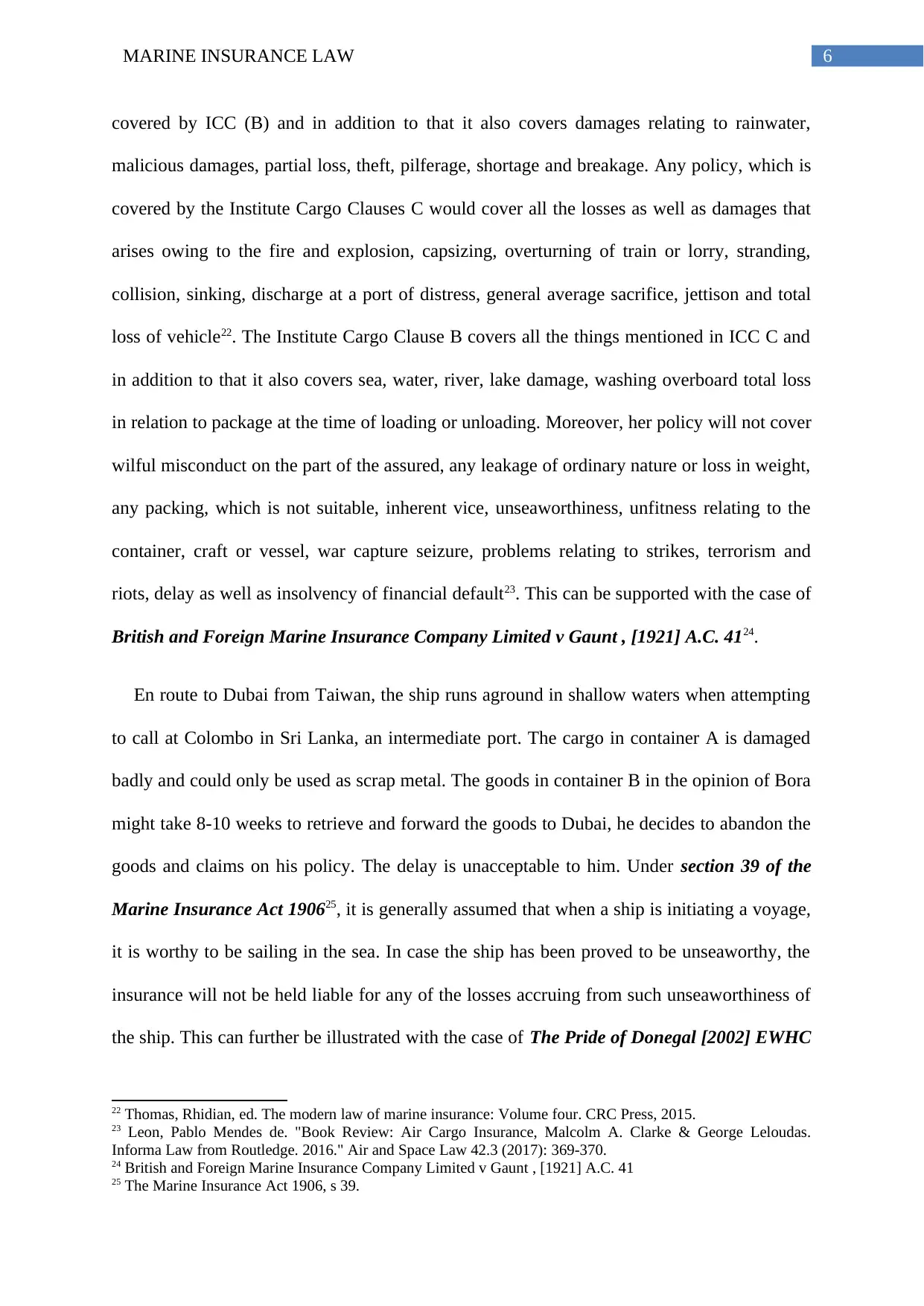
6MARINE INSURANCE LAW
covered by ICC (B) and in addition to that it also covers damages relating to rainwater,
malicious damages, partial loss, theft, pilferage, shortage and breakage. Any policy, which is
covered by the Institute Cargo Clauses C would cover all the losses as well as damages that
arises owing to the fire and explosion, capsizing, overturning of train or lorry, stranding,
collision, sinking, discharge at a port of distress, general average sacrifice, jettison and total
loss of vehicle22. The Institute Cargo Clause B covers all the things mentioned in ICC C and
in addition to that it also covers sea, water, river, lake damage, washing overboard total loss
in relation to package at the time of loading or unloading. Moreover, her policy will not cover
wilful misconduct on the part of the assured, any leakage of ordinary nature or loss in weight,
any packing, which is not suitable, inherent vice, unseaworthiness, unfitness relating to the
container, craft or vessel, war capture seizure, problems relating to strikes, terrorism and
riots, delay as well as insolvency of financial default23. This can be supported with the case of
British and Foreign Marine Insurance Company Limited v Gaunt , [1921] A.C. 4124.
En route to Dubai from Taiwan, the ship runs aground in shallow waters when attempting
to call at Colombo in Sri Lanka, an intermediate port. The cargo in container A is damaged
badly and could only be used as scrap metal. The goods in container B in the opinion of Bora
might take 8-10 weeks to retrieve and forward the goods to Dubai, he decides to abandon the
goods and claims on his policy. The delay is unacceptable to him. Under section 39 of the
Marine Insurance Act 190625, it is generally assumed that when a ship is initiating a voyage,
it is worthy to be sailing in the sea. In case the ship has been proved to be unseaworthy, the
insurance will not be held liable for any of the losses accruing from such unseaworthiness of
the ship. This can further be illustrated with the case of The Pride of Donegal [2002] EWHC
22 Thomas, Rhidian, ed. The modern law of marine insurance: Volume four. CRC Press, 2015.
23 Leon, Pablo Mendes de. "Book Review: Air Cargo Insurance, Malcolm A. Clarke & George Leloudas.
Informa Law from Routledge. 2016." Air and Space Law 42.3 (2017): 369-370.
24 British and Foreign Marine Insurance Company Limited v Gaunt , [1921] A.C. 41
25 The Marine Insurance Act 1906, s 39.
covered by ICC (B) and in addition to that it also covers damages relating to rainwater,
malicious damages, partial loss, theft, pilferage, shortage and breakage. Any policy, which is
covered by the Institute Cargo Clauses C would cover all the losses as well as damages that
arises owing to the fire and explosion, capsizing, overturning of train or lorry, stranding,
collision, sinking, discharge at a port of distress, general average sacrifice, jettison and total
loss of vehicle22. The Institute Cargo Clause B covers all the things mentioned in ICC C and
in addition to that it also covers sea, water, river, lake damage, washing overboard total loss
in relation to package at the time of loading or unloading. Moreover, her policy will not cover
wilful misconduct on the part of the assured, any leakage of ordinary nature or loss in weight,
any packing, which is not suitable, inherent vice, unseaworthiness, unfitness relating to the
container, craft or vessel, war capture seizure, problems relating to strikes, terrorism and
riots, delay as well as insolvency of financial default23. This can be supported with the case of
British and Foreign Marine Insurance Company Limited v Gaunt , [1921] A.C. 4124.
En route to Dubai from Taiwan, the ship runs aground in shallow waters when attempting
to call at Colombo in Sri Lanka, an intermediate port. The cargo in container A is damaged
badly and could only be used as scrap metal. The goods in container B in the opinion of Bora
might take 8-10 weeks to retrieve and forward the goods to Dubai, he decides to abandon the
goods and claims on his policy. The delay is unacceptable to him. Under section 39 of the
Marine Insurance Act 190625, it is generally assumed that when a ship is initiating a voyage,
it is worthy to be sailing in the sea. In case the ship has been proved to be unseaworthy, the
insurance will not be held liable for any of the losses accruing from such unseaworthiness of
the ship. This can further be illustrated with the case of The Pride of Donegal [2002] EWHC
22 Thomas, Rhidian, ed. The modern law of marine insurance: Volume four. CRC Press, 2015.
23 Leon, Pablo Mendes de. "Book Review: Air Cargo Insurance, Malcolm A. Clarke & George Leloudas.
Informa Law from Routledge. 2016." Air and Space Law 42.3 (2017): 369-370.
24 British and Foreign Marine Insurance Company Limited v Gaunt , [1921] A.C. 41
25 The Marine Insurance Act 1906, s 39.
Paraphrase This Document
Need a fresh take? Get an instant paraphrase of this document with our AI Paraphraser
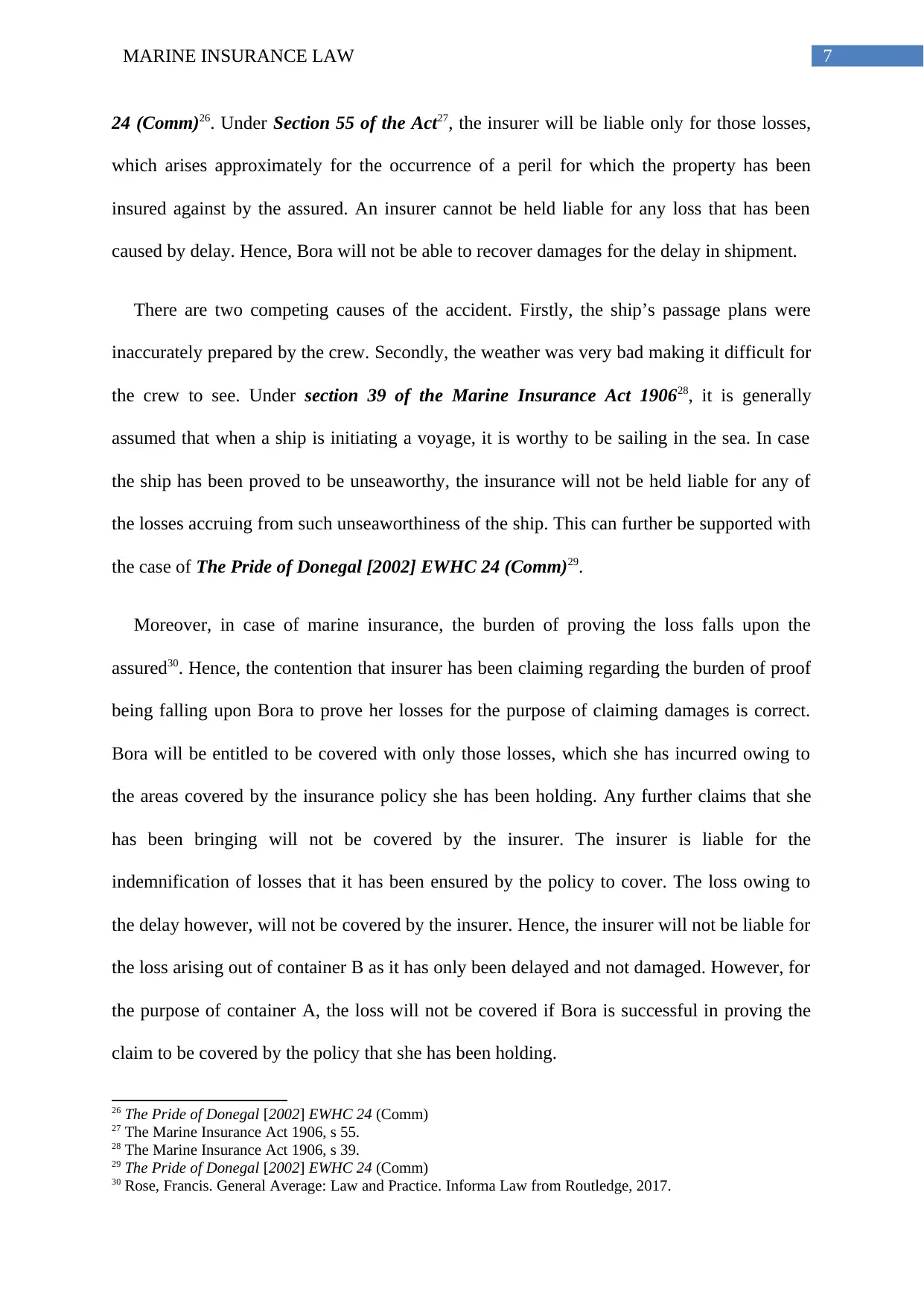
7MARINE INSURANCE LAW
24 (Comm)26. Under Section 55 of the Act27, the insurer will be liable only for those losses,
which arises approximately for the occurrence of a peril for which the property has been
insured against by the assured. An insurer cannot be held liable for any loss that has been
caused by delay. Hence, Bora will not be able to recover damages for the delay in shipment.
There are two competing causes of the accident. Firstly, the ship’s passage plans were
inaccurately prepared by the crew. Secondly, the weather was very bad making it difficult for
the crew to see. Under section 39 of the Marine Insurance Act 190628, it is generally
assumed that when a ship is initiating a voyage, it is worthy to be sailing in the sea. In case
the ship has been proved to be unseaworthy, the insurance will not be held liable for any of
the losses accruing from such unseaworthiness of the ship. This can further be supported with
the case of The Pride of Donegal [2002] EWHC 24 (Comm)29.
Moreover, in case of marine insurance, the burden of proving the loss falls upon the
assured30. Hence, the contention that insurer has been claiming regarding the burden of proof
being falling upon Bora to prove her losses for the purpose of claiming damages is correct.
Bora will be entitled to be covered with only those losses, which she has incurred owing to
the areas covered by the insurance policy she has been holding. Any further claims that she
has been bringing will not be covered by the insurer. The insurer is liable for the
indemnification of losses that it has been ensured by the policy to cover. The loss owing to
the delay however, will not be covered by the insurer. Hence, the insurer will not be liable for
the loss arising out of container B as it has only been delayed and not damaged. However, for
the purpose of container A, the loss will not be covered if Bora is successful in proving the
claim to be covered by the policy that she has been holding.
26 The Pride of Donegal [2002] EWHC 24 (Comm)
27 The Marine Insurance Act 1906, s 55.
28 The Marine Insurance Act 1906, s 39.
29 The Pride of Donegal [2002] EWHC 24 (Comm)
30 Rose, Francis. General Average: Law and Practice. Informa Law from Routledge, 2017.
24 (Comm)26. Under Section 55 of the Act27, the insurer will be liable only for those losses,
which arises approximately for the occurrence of a peril for which the property has been
insured against by the assured. An insurer cannot be held liable for any loss that has been
caused by delay. Hence, Bora will not be able to recover damages for the delay in shipment.
There are two competing causes of the accident. Firstly, the ship’s passage plans were
inaccurately prepared by the crew. Secondly, the weather was very bad making it difficult for
the crew to see. Under section 39 of the Marine Insurance Act 190628, it is generally
assumed that when a ship is initiating a voyage, it is worthy to be sailing in the sea. In case
the ship has been proved to be unseaworthy, the insurance will not be held liable for any of
the losses accruing from such unseaworthiness of the ship. This can further be supported with
the case of The Pride of Donegal [2002] EWHC 24 (Comm)29.
Moreover, in case of marine insurance, the burden of proving the loss falls upon the
assured30. Hence, the contention that insurer has been claiming regarding the burden of proof
being falling upon Bora to prove her losses for the purpose of claiming damages is correct.
Bora will be entitled to be covered with only those losses, which she has incurred owing to
the areas covered by the insurance policy she has been holding. Any further claims that she
has been bringing will not be covered by the insurer. The insurer is liable for the
indemnification of losses that it has been ensured by the policy to cover. The loss owing to
the delay however, will not be covered by the insurer. Hence, the insurer will not be liable for
the loss arising out of container B as it has only been delayed and not damaged. However, for
the purpose of container A, the loss will not be covered if Bora is successful in proving the
claim to be covered by the policy that she has been holding.
26 The Pride of Donegal [2002] EWHC 24 (Comm)
27 The Marine Insurance Act 1906, s 55.
28 The Marine Insurance Act 1906, s 39.
29 The Pride of Donegal [2002] EWHC 24 (Comm)
30 Rose, Francis. General Average: Law and Practice. Informa Law from Routledge, 2017.
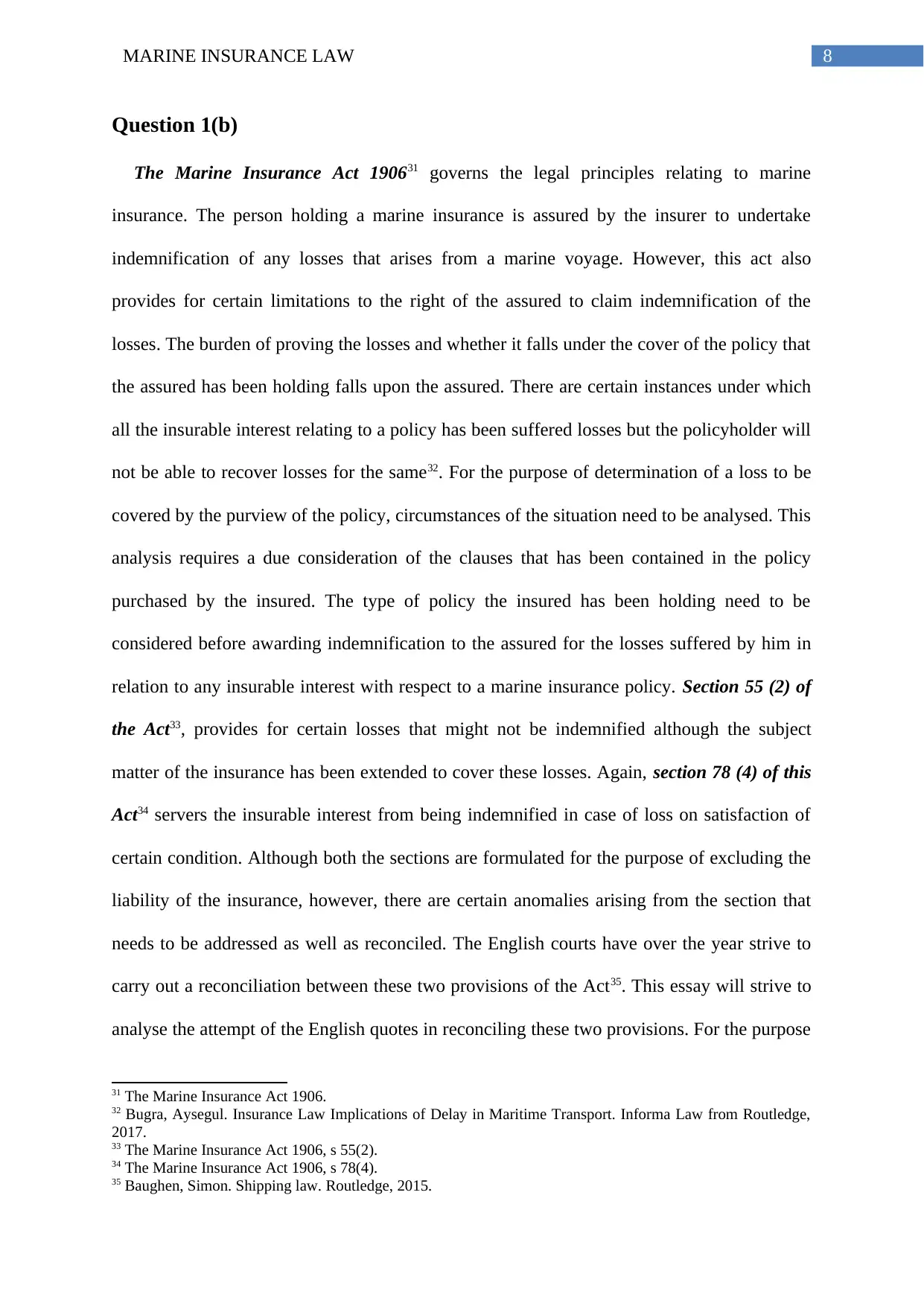
8MARINE INSURANCE LAW
Question 1(b)
The Marine Insurance Act 190631 governs the legal principles relating to marine
insurance. The person holding a marine insurance is assured by the insurer to undertake
indemnification of any losses that arises from a marine voyage. However, this act also
provides for certain limitations to the right of the assured to claim indemnification of the
losses. The burden of proving the losses and whether it falls under the cover of the policy that
the assured has been holding falls upon the assured. There are certain instances under which
all the insurable interest relating to a policy has been suffered losses but the policyholder will
not be able to recover losses for the same32. For the purpose of determination of a loss to be
covered by the purview of the policy, circumstances of the situation need to be analysed. This
analysis requires a due consideration of the clauses that has been contained in the policy
purchased by the insured. The type of policy the insured has been holding need to be
considered before awarding indemnification to the assured for the losses suffered by him in
relation to any insurable interest with respect to a marine insurance policy. Section 55 (2) of
the Act33, provides for certain losses that might not be indemnified although the subject
matter of the insurance has been extended to cover these losses. Again, section 78 (4) of this
Act34 servers the insurable interest from being indemnified in case of loss on satisfaction of
certain condition. Although both the sections are formulated for the purpose of excluding the
liability of the insurance, however, there are certain anomalies arising from the section that
needs to be addressed as well as reconciled. The English courts have over the year strive to
carry out a reconciliation between these two provisions of the Act35. This essay will strive to
analyse the attempt of the English quotes in reconciling these two provisions. For the purpose
31 The Marine Insurance Act 1906.
32 Bugra, Aysegul. Insurance Law Implications of Delay in Maritime Transport. Informa Law from Routledge,
2017.
33 The Marine Insurance Act 1906, s 55(2).
34 The Marine Insurance Act 1906, s 78(4).
35 Baughen, Simon. Shipping law. Routledge, 2015.
Question 1(b)
The Marine Insurance Act 190631 governs the legal principles relating to marine
insurance. The person holding a marine insurance is assured by the insurer to undertake
indemnification of any losses that arises from a marine voyage. However, this act also
provides for certain limitations to the right of the assured to claim indemnification of the
losses. The burden of proving the losses and whether it falls under the cover of the policy that
the assured has been holding falls upon the assured. There are certain instances under which
all the insurable interest relating to a policy has been suffered losses but the policyholder will
not be able to recover losses for the same32. For the purpose of determination of a loss to be
covered by the purview of the policy, circumstances of the situation need to be analysed. This
analysis requires a due consideration of the clauses that has been contained in the policy
purchased by the insured. The type of policy the insured has been holding need to be
considered before awarding indemnification to the assured for the losses suffered by him in
relation to any insurable interest with respect to a marine insurance policy. Section 55 (2) of
the Act33, provides for certain losses that might not be indemnified although the subject
matter of the insurance has been extended to cover these losses. Again, section 78 (4) of this
Act34 servers the insurable interest from being indemnified in case of loss on satisfaction of
certain condition. Although both the sections are formulated for the purpose of excluding the
liability of the insurance, however, there are certain anomalies arising from the section that
needs to be addressed as well as reconciled. The English courts have over the year strive to
carry out a reconciliation between these two provisions of the Act35. This essay will strive to
analyse the attempt of the English quotes in reconciling these two provisions. For the purpose
31 The Marine Insurance Act 1906.
32 Bugra, Aysegul. Insurance Law Implications of Delay in Maritime Transport. Informa Law from Routledge,
2017.
33 The Marine Insurance Act 1906, s 55(2).
34 The Marine Insurance Act 1906, s 78(4).
35 Baughen, Simon. Shipping law. Routledge, 2015.
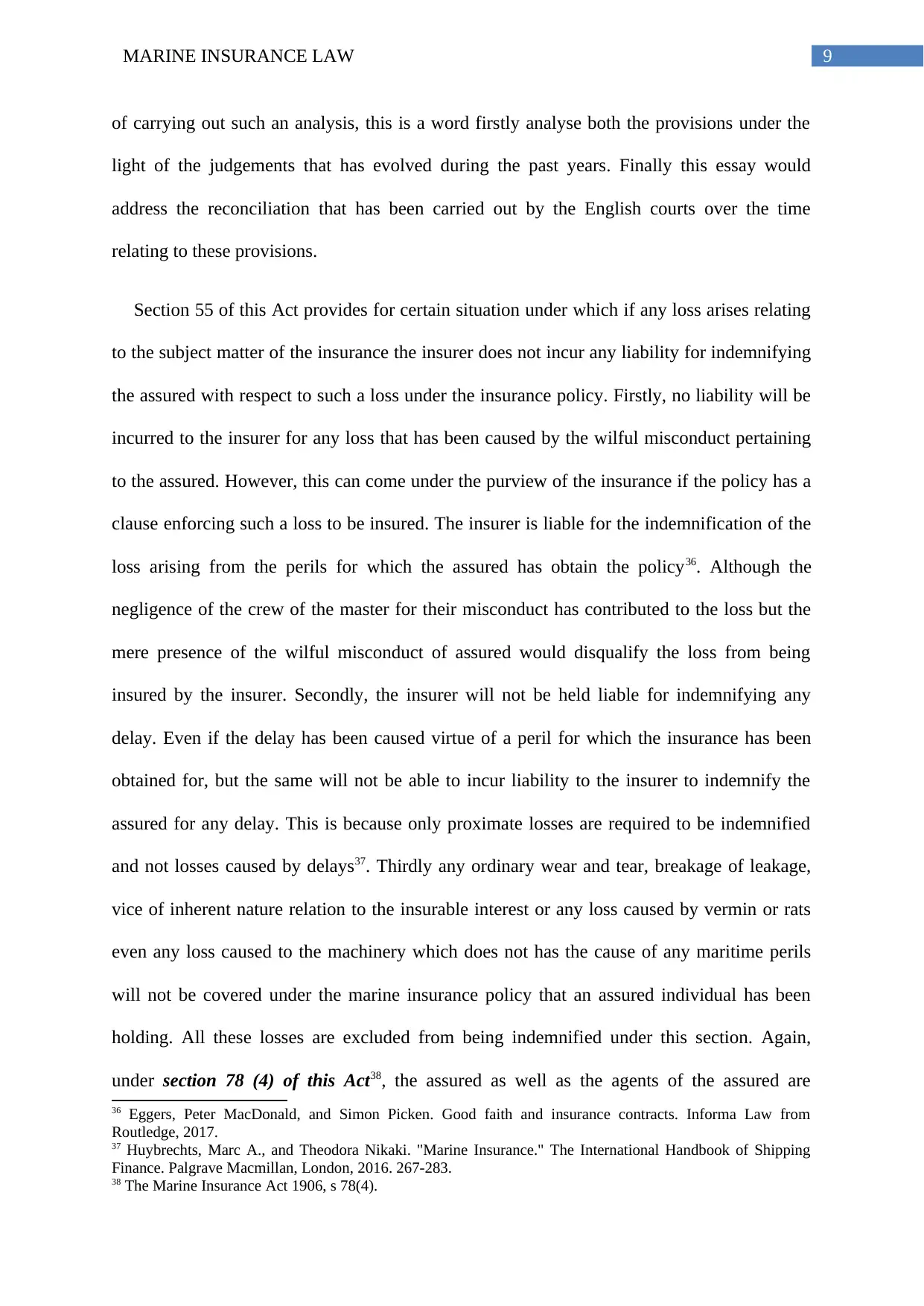
9MARINE INSURANCE LAW
of carrying out such an analysis, this is a word firstly analyse both the provisions under the
light of the judgements that has evolved during the past years. Finally this essay would
address the reconciliation that has been carried out by the English courts over the time
relating to these provisions.
Section 55 of this Act provides for certain situation under which if any loss arises relating
to the subject matter of the insurance the insurer does not incur any liability for indemnifying
the assured with respect to such a loss under the insurance policy. Firstly, no liability will be
incurred to the insurer for any loss that has been caused by the wilful misconduct pertaining
to the assured. However, this can come under the purview of the insurance if the policy has a
clause enforcing such a loss to be insured. The insurer is liable for the indemnification of the
loss arising from the perils for which the assured has obtain the policy36. Although the
negligence of the crew of the master for their misconduct has contributed to the loss but the
mere presence of the wilful misconduct of assured would disqualify the loss from being
insured by the insurer. Secondly, the insurer will not be held liable for indemnifying any
delay. Even if the delay has been caused virtue of a peril for which the insurance has been
obtained for, but the same will not be able to incur liability to the insurer to indemnify the
assured for any delay. This is because only proximate losses are required to be indemnified
and not losses caused by delays37. Thirdly any ordinary wear and tear, breakage of leakage,
vice of inherent nature relation to the insurable interest or any loss caused by vermin or rats
even any loss caused to the machinery which does not has the cause of any maritime perils
will not be covered under the marine insurance policy that an assured individual has been
holding. All these losses are excluded from being indemnified under this section. Again,
under section 78 (4) of this Act38, the assured as well as the agents of the assured are
36 Eggers, Peter MacDonald, and Simon Picken. Good faith and insurance contracts. Informa Law from
Routledge, 2017.
37 Huybrechts, Marc A., and Theodora Nikaki. "Marine Insurance." The International Handbook of Shipping
Finance. Palgrave Macmillan, London, 2016. 267-283.
38 The Marine Insurance Act 1906, s 78(4).
of carrying out such an analysis, this is a word firstly analyse both the provisions under the
light of the judgements that has evolved during the past years. Finally this essay would
address the reconciliation that has been carried out by the English courts over the time
relating to these provisions.
Section 55 of this Act provides for certain situation under which if any loss arises relating
to the subject matter of the insurance the insurer does not incur any liability for indemnifying
the assured with respect to such a loss under the insurance policy. Firstly, no liability will be
incurred to the insurer for any loss that has been caused by the wilful misconduct pertaining
to the assured. However, this can come under the purview of the insurance if the policy has a
clause enforcing such a loss to be insured. The insurer is liable for the indemnification of the
loss arising from the perils for which the assured has obtain the policy36. Although the
negligence of the crew of the master for their misconduct has contributed to the loss but the
mere presence of the wilful misconduct of assured would disqualify the loss from being
insured by the insurer. Secondly, the insurer will not be held liable for indemnifying any
delay. Even if the delay has been caused virtue of a peril for which the insurance has been
obtained for, but the same will not be able to incur liability to the insurer to indemnify the
assured for any delay. This is because only proximate losses are required to be indemnified
and not losses caused by delays37. Thirdly any ordinary wear and tear, breakage of leakage,
vice of inherent nature relation to the insurable interest or any loss caused by vermin or rats
even any loss caused to the machinery which does not has the cause of any maritime perils
will not be covered under the marine insurance policy that an assured individual has been
holding. All these losses are excluded from being indemnified under this section. Again,
under section 78 (4) of this Act38, the assured as well as the agents of the assured are
36 Eggers, Peter MacDonald, and Simon Picken. Good faith and insurance contracts. Informa Law from
Routledge, 2017.
37 Huybrechts, Marc A., and Theodora Nikaki. "Marine Insurance." The International Handbook of Shipping
Finance. Palgrave Macmillan, London, 2016. 267-283.
38 The Marine Insurance Act 1906, s 78(4).
Secure Best Marks with AI Grader
Need help grading? Try our AI Grader for instant feedback on your assignments.
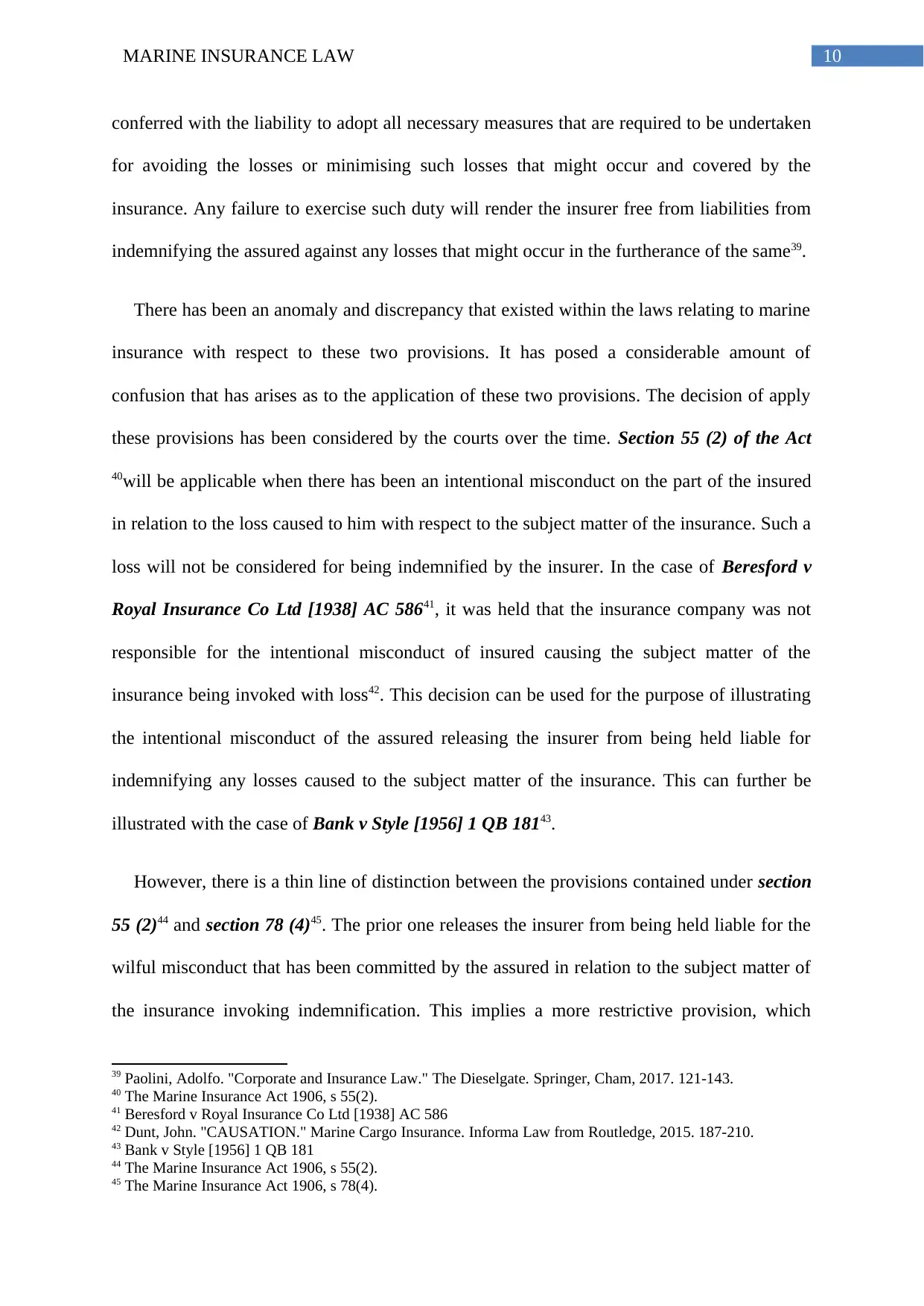
10MARINE INSURANCE LAW
conferred with the liability to adopt all necessary measures that are required to be undertaken
for avoiding the losses or minimising such losses that might occur and covered by the
insurance. Any failure to exercise such duty will render the insurer free from liabilities from
indemnifying the assured against any losses that might occur in the furtherance of the same39.
There has been an anomaly and discrepancy that existed within the laws relating to marine
insurance with respect to these two provisions. It has posed a considerable amount of
confusion that has arises as to the application of these two provisions. The decision of apply
these provisions has been considered by the courts over the time. Section 55 (2) of the Act
40will be applicable when there has been an intentional misconduct on the part of the insured
in relation to the loss caused to him with respect to the subject matter of the insurance. Such a
loss will not be considered for being indemnified by the insurer. In the case of Beresford v
Royal Insurance Co Ltd [1938] AC 58641, it was held that the insurance company was not
responsible for the intentional misconduct of insured causing the subject matter of the
insurance being invoked with loss42. This decision can be used for the purpose of illustrating
the intentional misconduct of the assured releasing the insurer from being held liable for
indemnifying any losses caused to the subject matter of the insurance. This can further be
illustrated with the case of Bank v Style [1956] 1 QB 18143.
However, there is a thin line of distinction between the provisions contained under section
55 (2)44 and section 78 (4)45. The prior one releases the insurer from being held liable for the
wilful misconduct that has been committed by the assured in relation to the subject matter of
the insurance invoking indemnification. This implies a more restrictive provision, which
39 Paolini, Adolfo. "Corporate and Insurance Law." The Dieselgate. Springer, Cham, 2017. 121-143.
40 The Marine Insurance Act 1906, s 55(2).
41 Beresford v Royal Insurance Co Ltd [1938] AC 586
42 Dunt, John. "CAUSATION." Marine Cargo Insurance. Informa Law from Routledge, 2015. 187-210.
43 Bank v Style [1956] 1 QB 181
44 The Marine Insurance Act 1906, s 55(2).
45 The Marine Insurance Act 1906, s 78(4).
conferred with the liability to adopt all necessary measures that are required to be undertaken
for avoiding the losses or minimising such losses that might occur and covered by the
insurance. Any failure to exercise such duty will render the insurer free from liabilities from
indemnifying the assured against any losses that might occur in the furtherance of the same39.
There has been an anomaly and discrepancy that existed within the laws relating to marine
insurance with respect to these two provisions. It has posed a considerable amount of
confusion that has arises as to the application of these two provisions. The decision of apply
these provisions has been considered by the courts over the time. Section 55 (2) of the Act
40will be applicable when there has been an intentional misconduct on the part of the insured
in relation to the loss caused to him with respect to the subject matter of the insurance. Such a
loss will not be considered for being indemnified by the insurer. In the case of Beresford v
Royal Insurance Co Ltd [1938] AC 58641, it was held that the insurance company was not
responsible for the intentional misconduct of insured causing the subject matter of the
insurance being invoked with loss42. This decision can be used for the purpose of illustrating
the intentional misconduct of the assured releasing the insurer from being held liable for
indemnifying any losses caused to the subject matter of the insurance. This can further be
illustrated with the case of Bank v Style [1956] 1 QB 18143.
However, there is a thin line of distinction between the provisions contained under section
55 (2)44 and section 78 (4)45. The prior one releases the insurer from being held liable for the
wilful misconduct that has been committed by the assured in relation to the subject matter of
the insurance invoking indemnification. This implies a more restrictive provision, which
39 Paolini, Adolfo. "Corporate and Insurance Law." The Dieselgate. Springer, Cham, 2017. 121-143.
40 The Marine Insurance Act 1906, s 55(2).
41 Beresford v Royal Insurance Co Ltd [1938] AC 586
42 Dunt, John. "CAUSATION." Marine Cargo Insurance. Informa Law from Routledge, 2015. 187-210.
43 Bank v Style [1956] 1 QB 181
44 The Marine Insurance Act 1906, s 55(2).
45 The Marine Insurance Act 1906, s 78(4).
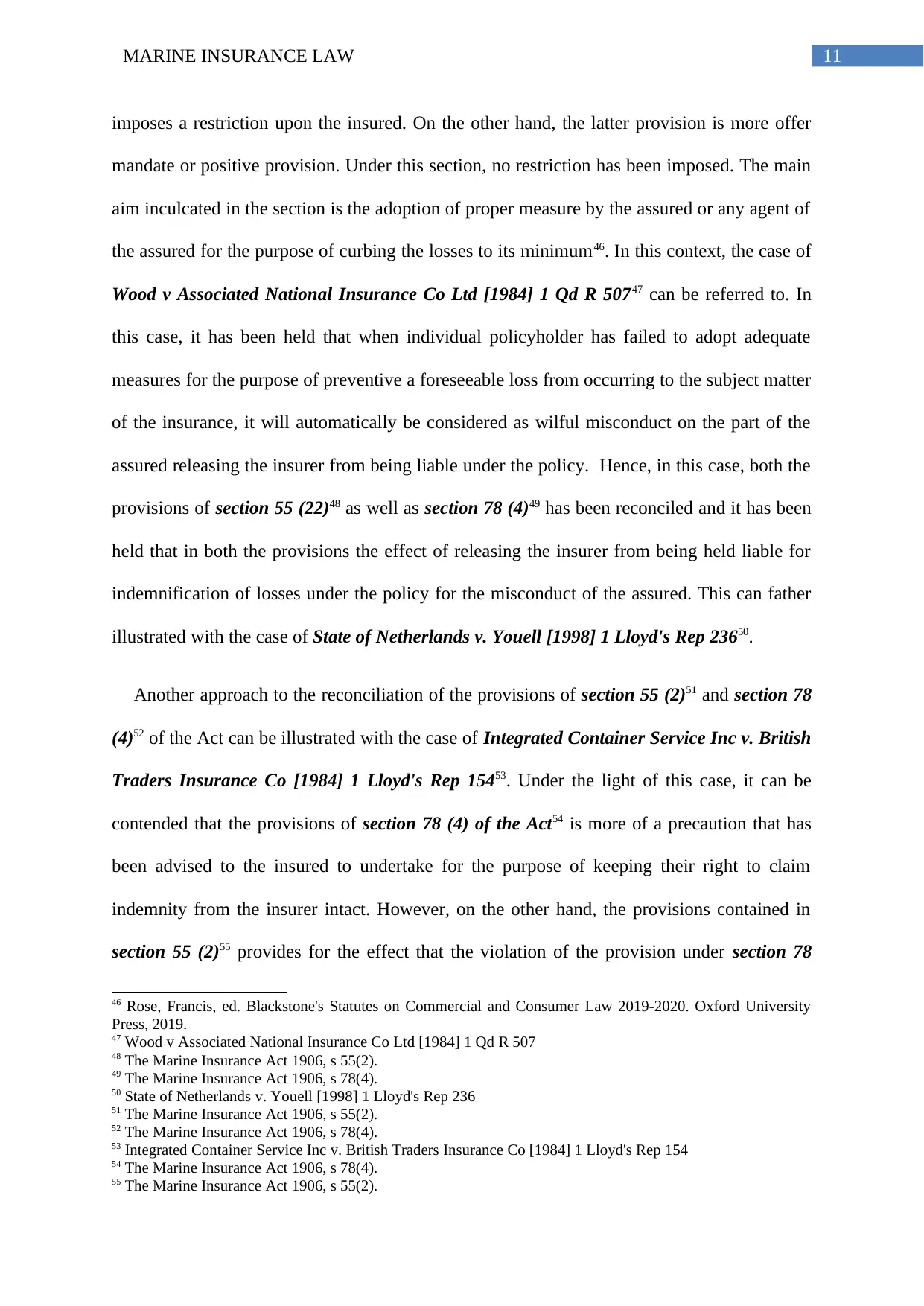
11MARINE INSURANCE LAW
imposes a restriction upon the insured. On the other hand, the latter provision is more offer
mandate or positive provision. Under this section, no restriction has been imposed. The main
aim inculcated in the section is the adoption of proper measure by the assured or any agent of
the assured for the purpose of curbing the losses to its minimum46. In this context, the case of
Wood v Associated National Insurance Co Ltd [1984] 1 Qd R 50747 can be referred to. In
this case, it has been held that when individual policyholder has failed to adopt adequate
measures for the purpose of preventive a foreseeable loss from occurring to the subject matter
of the insurance, it will automatically be considered as wilful misconduct on the part of the
assured releasing the insurer from being liable under the policy. Hence, in this case, both the
provisions of section 55 (22)48 as well as section 78 (4)49 has been reconciled and it has been
held that in both the provisions the effect of releasing the insurer from being held liable for
indemnification of losses under the policy for the misconduct of the assured. This can father
illustrated with the case of State of Netherlands v. Youell [1998] 1 Lloyd's Rep 23650.
Another approach to the reconciliation of the provisions of section 55 (2)51 and section 78
(4)52 of the Act can be illustrated with the case of Integrated Container Service Inc v. British
Traders Insurance Co [1984] 1 Lloyd's Rep 15453. Under the light of this case, it can be
contended that the provisions of section 78 (4) of the Act54 is more of a precaution that has
been advised to the insured to undertake for the purpose of keeping their right to claim
indemnity from the insurer intact. However, on the other hand, the provisions contained in
section 55 (2)55 provides for the effect that the violation of the provision under section 78
46 Rose, Francis, ed. Blackstone's Statutes on Commercial and Consumer Law 2019-2020. Oxford University
Press, 2019.
47 Wood v Associated National Insurance Co Ltd [1984] 1 Qd R 507
48 The Marine Insurance Act 1906, s 55(2).
49 The Marine Insurance Act 1906, s 78(4).
50 State of Netherlands v. Youell [1998] 1 Lloyd's Rep 236
51 The Marine Insurance Act 1906, s 55(2).
52 The Marine Insurance Act 1906, s 78(4).
53 Integrated Container Service Inc v. British Traders Insurance Co [1984] 1 Lloyd's Rep 154
54 The Marine Insurance Act 1906, s 78(4).
55 The Marine Insurance Act 1906, s 55(2).
imposes a restriction upon the insured. On the other hand, the latter provision is more offer
mandate or positive provision. Under this section, no restriction has been imposed. The main
aim inculcated in the section is the adoption of proper measure by the assured or any agent of
the assured for the purpose of curbing the losses to its minimum46. In this context, the case of
Wood v Associated National Insurance Co Ltd [1984] 1 Qd R 50747 can be referred to. In
this case, it has been held that when individual policyholder has failed to adopt adequate
measures for the purpose of preventive a foreseeable loss from occurring to the subject matter
of the insurance, it will automatically be considered as wilful misconduct on the part of the
assured releasing the insurer from being liable under the policy. Hence, in this case, both the
provisions of section 55 (22)48 as well as section 78 (4)49 has been reconciled and it has been
held that in both the provisions the effect of releasing the insurer from being held liable for
indemnification of losses under the policy for the misconduct of the assured. This can father
illustrated with the case of State of Netherlands v. Youell [1998] 1 Lloyd's Rep 23650.
Another approach to the reconciliation of the provisions of section 55 (2)51 and section 78
(4)52 of the Act can be illustrated with the case of Integrated Container Service Inc v. British
Traders Insurance Co [1984] 1 Lloyd's Rep 15453. Under the light of this case, it can be
contended that the provisions of section 78 (4) of the Act54 is more of a precaution that has
been advised to the insured to undertake for the purpose of keeping their right to claim
indemnity from the insurer intact. However, on the other hand, the provisions contained in
section 55 (2)55 provides for the effect that the violation of the provision under section 78
46 Rose, Francis, ed. Blackstone's Statutes on Commercial and Consumer Law 2019-2020. Oxford University
Press, 2019.
47 Wood v Associated National Insurance Co Ltd [1984] 1 Qd R 507
48 The Marine Insurance Act 1906, s 55(2).
49 The Marine Insurance Act 1906, s 78(4).
50 State of Netherlands v. Youell [1998] 1 Lloyd's Rep 236
51 The Marine Insurance Act 1906, s 55(2).
52 The Marine Insurance Act 1906, s 78(4).
53 Integrated Container Service Inc v. British Traders Insurance Co [1984] 1 Lloyd's Rep 154
54 The Marine Insurance Act 1906, s 78(4).
55 The Marine Insurance Act 1906, s 55(2).
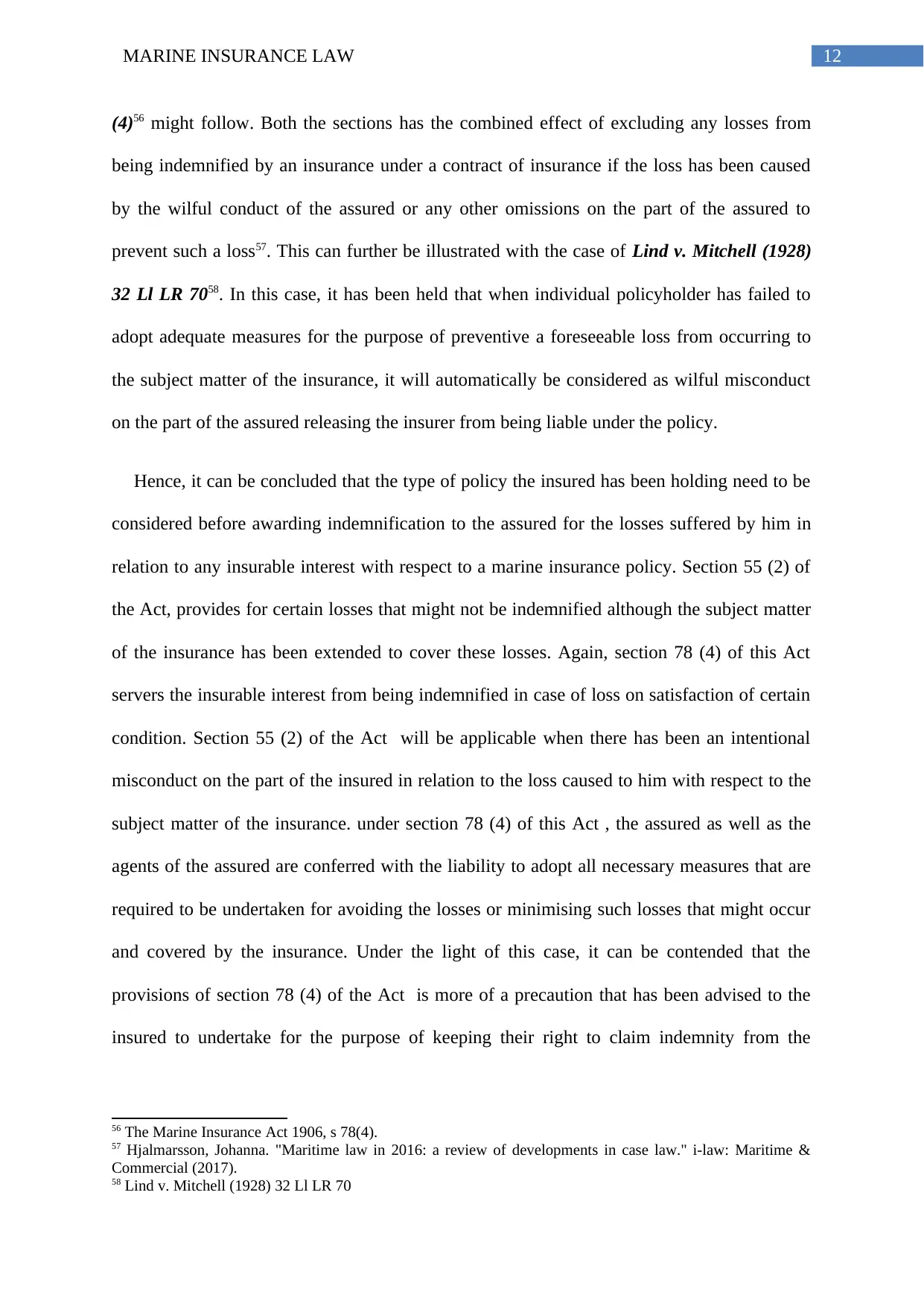
12MARINE INSURANCE LAW
(4)56 might follow. Both the sections has the combined effect of excluding any losses from
being indemnified by an insurance under a contract of insurance if the loss has been caused
by the wilful conduct of the assured or any other omissions on the part of the assured to
prevent such a loss57. This can further be illustrated with the case of Lind v. Mitchell (1928)
32 Ll LR 7058. In this case, it has been held that when individual policyholder has failed to
adopt adequate measures for the purpose of preventive a foreseeable loss from occurring to
the subject matter of the insurance, it will automatically be considered as wilful misconduct
on the part of the assured releasing the insurer from being liable under the policy.
Hence, it can be concluded that the type of policy the insured has been holding need to be
considered before awarding indemnification to the assured for the losses suffered by him in
relation to any insurable interest with respect to a marine insurance policy. Section 55 (2) of
the Act, provides for certain losses that might not be indemnified although the subject matter
of the insurance has been extended to cover these losses. Again, section 78 (4) of this Act
servers the insurable interest from being indemnified in case of loss on satisfaction of certain
condition. Section 55 (2) of the Act will be applicable when there has been an intentional
misconduct on the part of the insured in relation to the loss caused to him with respect to the
subject matter of the insurance. under section 78 (4) of this Act , the assured as well as the
agents of the assured are conferred with the liability to adopt all necessary measures that are
required to be undertaken for avoiding the losses or minimising such losses that might occur
and covered by the insurance. Under the light of this case, it can be contended that the
provisions of section 78 (4) of the Act is more of a precaution that has been advised to the
insured to undertake for the purpose of keeping their right to claim indemnity from the
56 The Marine Insurance Act 1906, s 78(4).
57 Hjalmarsson, Johanna. "Maritime law in 2016: a review of developments in case law." i-law: Maritime &
Commercial (2017).
58 Lind v. Mitchell (1928) 32 Ll LR 70
(4)56 might follow. Both the sections has the combined effect of excluding any losses from
being indemnified by an insurance under a contract of insurance if the loss has been caused
by the wilful conduct of the assured or any other omissions on the part of the assured to
prevent such a loss57. This can further be illustrated with the case of Lind v. Mitchell (1928)
32 Ll LR 7058. In this case, it has been held that when individual policyholder has failed to
adopt adequate measures for the purpose of preventive a foreseeable loss from occurring to
the subject matter of the insurance, it will automatically be considered as wilful misconduct
on the part of the assured releasing the insurer from being liable under the policy.
Hence, it can be concluded that the type of policy the insured has been holding need to be
considered before awarding indemnification to the assured for the losses suffered by him in
relation to any insurable interest with respect to a marine insurance policy. Section 55 (2) of
the Act, provides for certain losses that might not be indemnified although the subject matter
of the insurance has been extended to cover these losses. Again, section 78 (4) of this Act
servers the insurable interest from being indemnified in case of loss on satisfaction of certain
condition. Section 55 (2) of the Act will be applicable when there has been an intentional
misconduct on the part of the insured in relation to the loss caused to him with respect to the
subject matter of the insurance. under section 78 (4) of this Act , the assured as well as the
agents of the assured are conferred with the liability to adopt all necessary measures that are
required to be undertaken for avoiding the losses or minimising such losses that might occur
and covered by the insurance. Under the light of this case, it can be contended that the
provisions of section 78 (4) of the Act is more of a precaution that has been advised to the
insured to undertake for the purpose of keeping their right to claim indemnity from the
56 The Marine Insurance Act 1906, s 78(4).
57 Hjalmarsson, Johanna. "Maritime law in 2016: a review of developments in case law." i-law: Maritime &
Commercial (2017).
58 Lind v. Mitchell (1928) 32 Ll LR 70
Paraphrase This Document
Need a fresh take? Get an instant paraphrase of this document with our AI Paraphraser
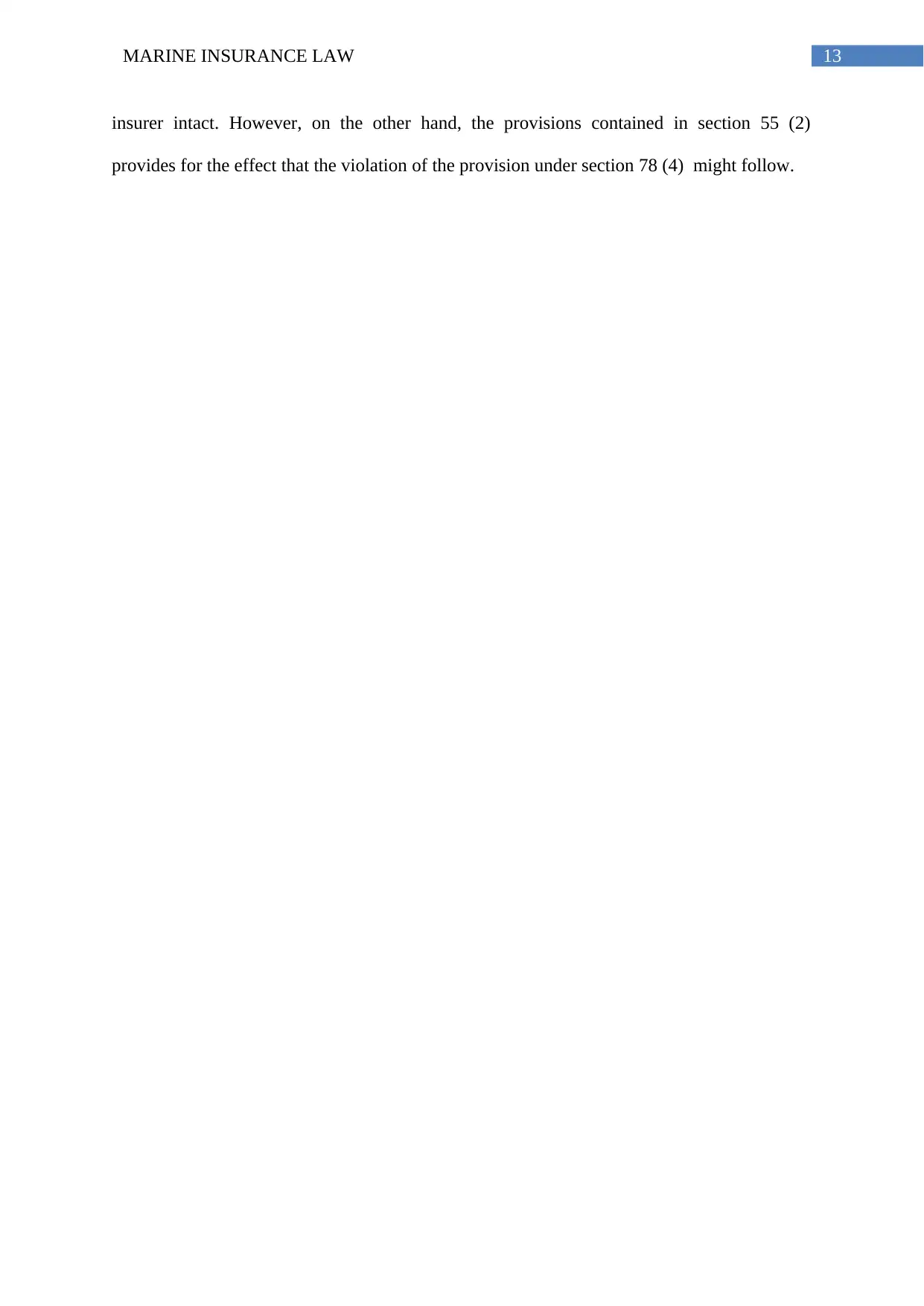
13MARINE INSURANCE LAW
insurer intact. However, on the other hand, the provisions contained in section 55 (2)
provides for the effect that the violation of the provision under section 78 (4) might follow.
insurer intact. However, on the other hand, the provisions contained in section 55 (2)
provides for the effect that the violation of the provision under section 78 (4) might follow.
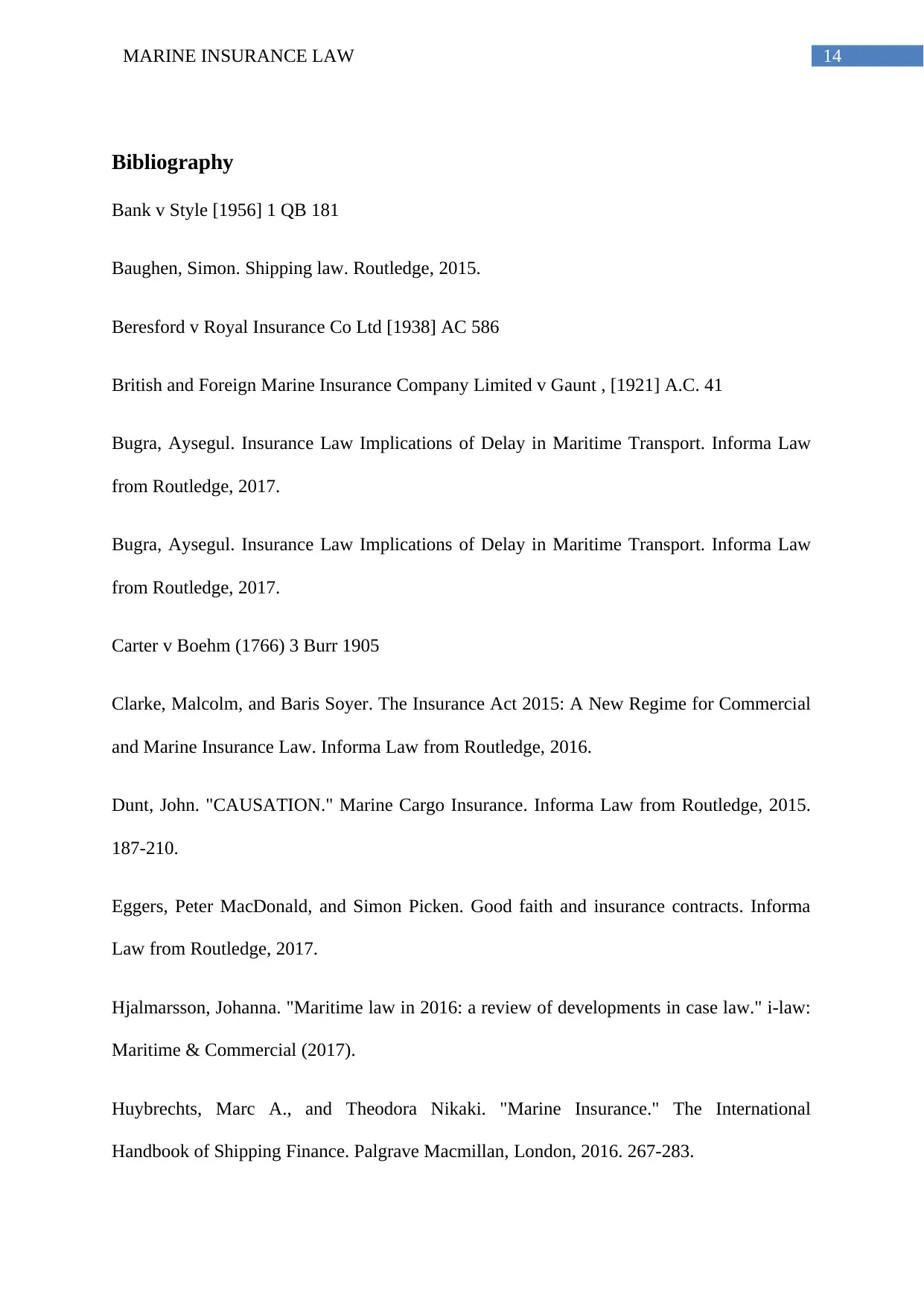
14MARINE INSURANCE LAW
Bibliography
Bank v Style [1956] 1 QB 181
Baughen, Simon. Shipping law. Routledge, 2015.
Beresford v Royal Insurance Co Ltd [1938] AC 586
British and Foreign Marine Insurance Company Limited v Gaunt , [1921] A.C. 41
Bugra, Aysegul. Insurance Law Implications of Delay in Maritime Transport. Informa Law
from Routledge, 2017.
Bugra, Aysegul. Insurance Law Implications of Delay in Maritime Transport. Informa Law
from Routledge, 2017.
Carter v Boehm (1766) 3 Burr 1905
Clarke, Malcolm, and Baris Soyer. The Insurance Act 2015: A New Regime for Commercial
and Marine Insurance Law. Informa Law from Routledge, 2016.
Dunt, John. "CAUSATION." Marine Cargo Insurance. Informa Law from Routledge, 2015.
187-210.
Eggers, Peter MacDonald, and Simon Picken. Good faith and insurance contracts. Informa
Law from Routledge, 2017.
Hjalmarsson, Johanna. "Maritime law in 2016: a review of developments in case law." i-law:
Maritime & Commercial (2017).
Huybrechts, Marc A., and Theodora Nikaki. "Marine Insurance." The International
Handbook of Shipping Finance. Palgrave Macmillan, London, 2016. 267-283.
Bibliography
Bank v Style [1956] 1 QB 181
Baughen, Simon. Shipping law. Routledge, 2015.
Beresford v Royal Insurance Co Ltd [1938] AC 586
British and Foreign Marine Insurance Company Limited v Gaunt , [1921] A.C. 41
Bugra, Aysegul. Insurance Law Implications of Delay in Maritime Transport. Informa Law
from Routledge, 2017.
Bugra, Aysegul. Insurance Law Implications of Delay in Maritime Transport. Informa Law
from Routledge, 2017.
Carter v Boehm (1766) 3 Burr 1905
Clarke, Malcolm, and Baris Soyer. The Insurance Act 2015: A New Regime for Commercial
and Marine Insurance Law. Informa Law from Routledge, 2016.
Dunt, John. "CAUSATION." Marine Cargo Insurance. Informa Law from Routledge, 2015.
187-210.
Eggers, Peter MacDonald, and Simon Picken. Good faith and insurance contracts. Informa
Law from Routledge, 2017.
Hjalmarsson, Johanna. "Maritime law in 2016: a review of developments in case law." i-law:
Maritime & Commercial (2017).
Huybrechts, Marc A., and Theodora Nikaki. "Marine Insurance." The International
Handbook of Shipping Finance. Palgrave Macmillan, London, 2016. 267-283.
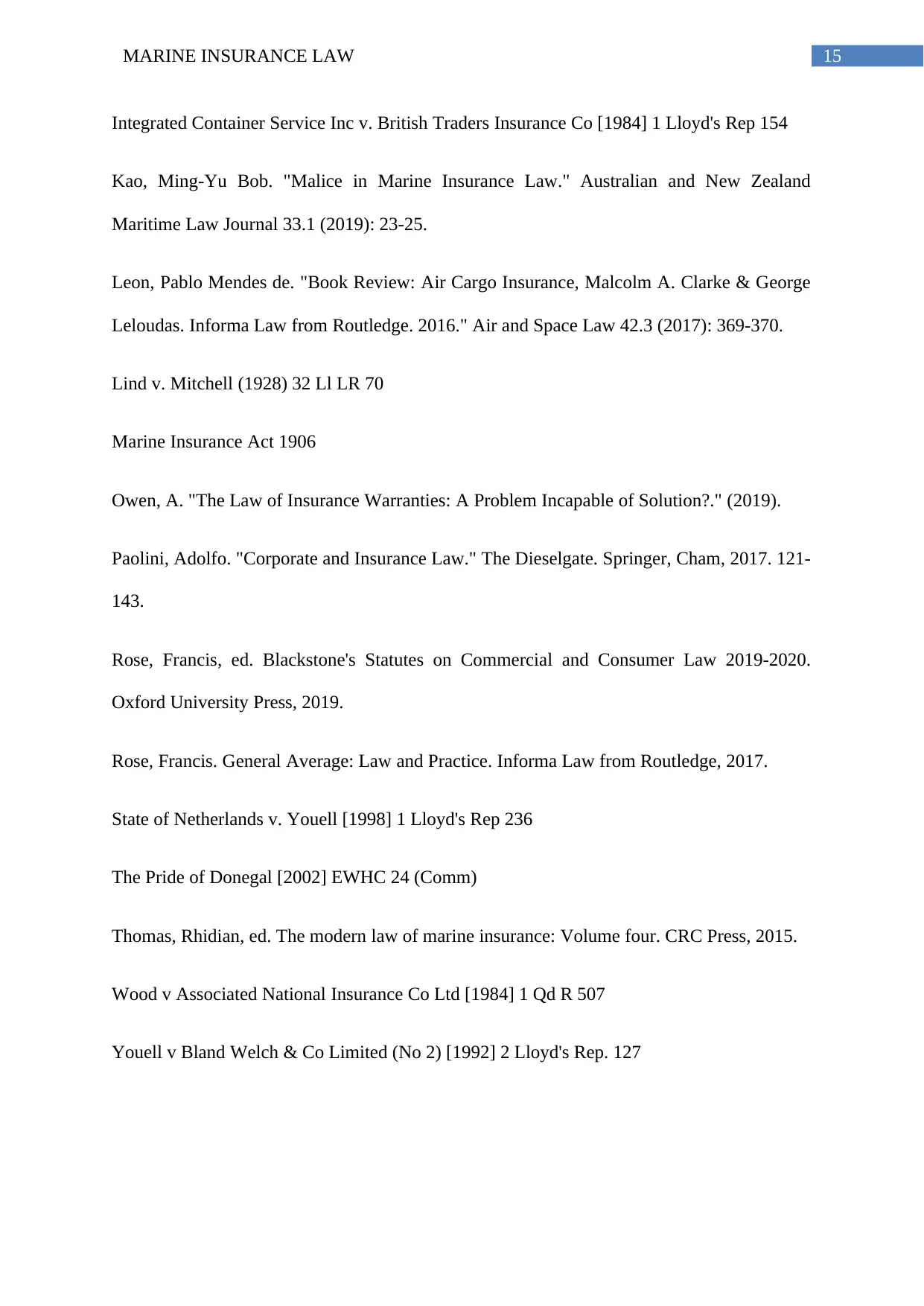
15MARINE INSURANCE LAW
Integrated Container Service Inc v. British Traders Insurance Co [1984] 1 Lloyd's Rep 154
Kao, Ming-Yu Bob. "Malice in Marine Insurance Law." Australian and New Zealand
Maritime Law Journal 33.1 (2019): 23-25.
Leon, Pablo Mendes de. "Book Review: Air Cargo Insurance, Malcolm A. Clarke & George
Leloudas. Informa Law from Routledge. 2016." Air and Space Law 42.3 (2017): 369-370.
Lind v. Mitchell (1928) 32 Ll LR 70
Marine Insurance Act 1906
Owen, A. "The Law of Insurance Warranties: A Problem Incapable of Solution?." (2019).
Paolini, Adolfo. "Corporate and Insurance Law." The Dieselgate. Springer, Cham, 2017. 121-
143.
Rose, Francis, ed. Blackstone's Statutes on Commercial and Consumer Law 2019-2020.
Oxford University Press, 2019.
Rose, Francis. General Average: Law and Practice. Informa Law from Routledge, 2017.
State of Netherlands v. Youell [1998] 1 Lloyd's Rep 236
The Pride of Donegal [2002] EWHC 24 (Comm)
Thomas, Rhidian, ed. The modern law of marine insurance: Volume four. CRC Press, 2015.
Wood v Associated National Insurance Co Ltd [1984] 1 Qd R 507
Youell v Bland Welch & Co Limited (No 2) [1992] 2 Lloyd's Rep. 127
Integrated Container Service Inc v. British Traders Insurance Co [1984] 1 Lloyd's Rep 154
Kao, Ming-Yu Bob. "Malice in Marine Insurance Law." Australian and New Zealand
Maritime Law Journal 33.1 (2019): 23-25.
Leon, Pablo Mendes de. "Book Review: Air Cargo Insurance, Malcolm A. Clarke & George
Leloudas. Informa Law from Routledge. 2016." Air and Space Law 42.3 (2017): 369-370.
Lind v. Mitchell (1928) 32 Ll LR 70
Marine Insurance Act 1906
Owen, A. "The Law of Insurance Warranties: A Problem Incapable of Solution?." (2019).
Paolini, Adolfo. "Corporate and Insurance Law." The Dieselgate. Springer, Cham, 2017. 121-
143.
Rose, Francis, ed. Blackstone's Statutes on Commercial and Consumer Law 2019-2020.
Oxford University Press, 2019.
Rose, Francis. General Average: Law and Practice. Informa Law from Routledge, 2017.
State of Netherlands v. Youell [1998] 1 Lloyd's Rep 236
The Pride of Donegal [2002] EWHC 24 (Comm)
Thomas, Rhidian, ed. The modern law of marine insurance: Volume four. CRC Press, 2015.
Wood v Associated National Insurance Co Ltd [1984] 1 Qd R 507
Youell v Bland Welch & Co Limited (No 2) [1992] 2 Lloyd's Rep. 127
1 out of 16
Your All-in-One AI-Powered Toolkit for Academic Success.
+13062052269
info@desklib.com
Available 24*7 on WhatsApp / Email
![[object Object]](/_next/static/media/star-bottom.7253800d.svg)
Unlock your academic potential
© 2024 | Zucol Services PVT LTD | All rights reserved.

